

7 Must-Have Thesis Writing Tools in 2021
Writing tools like Grammarly, Mendeley online, Thesaurus, BibMe, Evernote, Plagiarism checker, Hemingway Editor, Stay Focused and Dissertation authors have significant importance in thesis writing.
Traditionally, writing a thesis for either PhD or dissertation was a tougher task, needing huge manual writing, Proofreading, correction, re-writing, and editing things manually.
So, it was tedious, time-consuming and depressive and therefore no one wants to go for a doctorate. However, the recent scenario is totally different, now we have computers, mobile phones and a lot of apps.
Things can be done at a fingertip, with one click and all done! Thanks to high-power computers and apps. “Useful” apps make tasks, work and everyday life easy for us.
We now have apps for writing, proofreading, arranging documents, taking instant and important notes, doing citation & referencing and other stuff during your research. This article explains how a PhD student can utilize apps that are useful. I will also explain how you can use it.
Features of Mendeley:
How to use mendeley , how to cite the work , features of evernote , how to use evernote , features of bibme are: , how to use bibme, how to use thesaurus , how to use dissertationauthers , features of grammarly: .
- How to use Grammarly?
Features of Hemingway Editor:
Wrapping up: , 7 must-have thesis writing tools in 2021, mendeley: .
Citing articles and enlisting references orderly isn’t an easy task; it’s time-consuming and tiresome. But what if a tool can do all this work seamlessly, effectively and precisely? Mendeley is that one tool you need.
Every PhD must have Mendeley- a reference manager tool. This app or web portal is exclusively designed to manage bibliography and citations therefore it must be there on every PhD students’ laptop.
Four amazing features of Mendeley are,
- You can store articles, PhD, journal reads on your Mendeley.
- It automatically creates a reference format.
- It can cite every bit of information seamlessly and precisely when integrated.
Meaning just read the article from Mendeley, write your content in MS word and just do insert a citation. It automatically inserts the related citation and reference at the end of the page.
Besides, several other features are,
- It automatically generates a bibliography
- You can import a pdf and research papers from other sources
- You can find the relevant articles to what you are reading
- You can collab with other researchers online
- You can access all your article libraries from anywhere by logging in to your account.
The Mendeley is developed by Elsevier Publication available on Windows, macOS and Linux.
- Go to www.mendeley.com from your computer
- Click on “create a free account”.
- Enter your email address and continue your work.
- Download the ‘Mendeley for desktop’ software
- Start adding reading materials, pdfs and research articles or create your own library.
- To use Mendeley for citation and referencing, first from your Mendeley app for tools and click on ‘Install MS word Plugin’.
- Go to MS word>> referencing and insert citation using the Mendeley.
Now you are ready to use, write literature from the article and just click on insert citation and your work is ready.
We are planning to write a whole article on the present topic, how to use it and how helpful it is, that article’s we will provide you later.
In summary, the very first software or app or tool every PhD student is required is Mendeley to write a thesis. It’s a citation and reference manager tool.
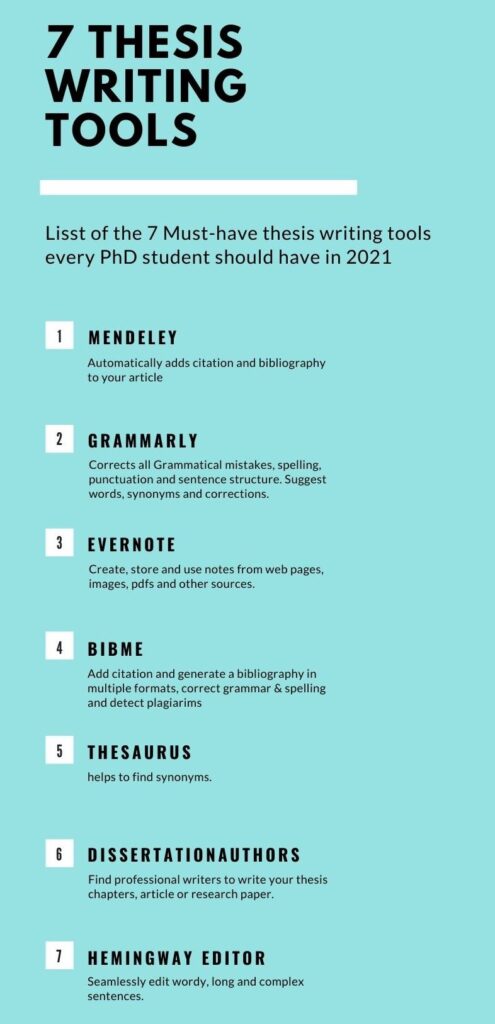
“Notes” as writing, images, pdf, article, news paragraph is an everyday part of a PhD student . Whatever you read, whenever you find things related to your PhD topic, you have to keep a note.
And trust me keeping notes isn’t so easy. If you fail to make it up, you will forget it the next morning. Evernote- is a tool that keeps your notes from desktop, mobile or any other device and syncs them.
- You can scan and save documents, label them, make important sentences underline and create pdf.
- You can even save rich notes, save images, record audio, capture ideas.
- You even can save entire or partial web pages.
- You can mark, highlight, underline, and pinpoint every note you capture.
- And guess what you can excess it from anywhere.
Go to www.evernote.com and click on sign in.
Now click on ‘create account’ and create one using your email address.
Or you can download the desktop apps.
In summary, to keep notes seamlessly and organized, the Evernote tool is required. Moreover, users can create keyboard shortcuts, note links, anchor notes to remember and share notes.
BibMe:
BibMe- The online writing center is the tool or service developed by Chegg. It has many features to improve your academic writing and PhD work.
One of the best features it has is it cites your work using different styles, even using their recent version of the style.
- You can create accurate citations in multiple styles
- Insert citation and references in your article or paper
- Improve your writing by improving sentence structure, grammar and spelling
- It can also detect plagiarism and can correct it.
Go to www.bibme.org .
Click on ‘Create account’. Create your account using your email address and use their features.
In summary, a BibMe app is an excellent tool, however, it isn’t available as a plugin for MS Word. You can use the free version or can use the paid version to explore more features.
Thesaurus:
Academic writing should be professional and precise, one needs to choose the correct word as per the sentence requirement. Using Thesaurus you can find synonyms of various words.
Besides, You can find antonyms and choose acronyms and abbreviations.
Go to www.thesaurus.com .
Click on synonyms and type your word in the search box.
In summary, Thesaurus makes your writing impressive when you use synonyms and transient words.
Disserationauthors:
Writing a research paper, review article or thesis is quite hard for a novice, you may feel helpless sometimes when your writeup is rejected multiple times. Even if you don’t understand what is wrong with your part.
If you feel so, don’t worry you can hire writers, experts or writing assistance who helps you. Dissertationauthors hire expert writers for you basically from the USA and UK.
- Go to www.dissertationauthors.com .
- Fill the order form
- Pay for your write up or paper
- Reach your personal writer
- Download your completed work
In summary, students have to write their own stuff, however, if your writing isn’t of that level you can use this service.
Grammarly:
Grammar, spelling and synonyms are common problems every research student faces, specifically those who aren’t from a pure English background. Imagine, what if some software or tool can do all stuff automatically!
Grammarly is exactly that one tool. They have free and paid plans available, however, the free version is enough for most students.
It has many services in which the Google chrome “add on” extension is the best. When activated it automatically detects and corrects English problems to all documents.
Related article: Grammarly: Your PhD writing assistant
- Correct spelling and Grammer
- Correct wordy sentences
- Suggest punctuations
- Structurize the sentence
- Check plagiarism
- Adds more transient words and synonyms
- And a lot more…
Read more: How to Check Plagiarism for PhD Thesis?- Top 10 Plagiarism Checkers
How to use Grammarly?
- Go to www.grammarly.com
- Sign in or sign up for your account.
- Go to the Google chrome extension search for Grammarly.
- Add Grammarly to your chrome extension.
- Do a quick setting as per your requirement.
In summary, Grammarly is the one tool or software that must be present on every PhD fellow’s laptop. Its technology is based on AI, meaning as you write more, it understands your style more and suggests accordingly.
Moreover, it also mails you your performances, common problems and how you can improve.
Hemingway Editor
This software is somehow similar to Grammarly, however, it has something unique in it. It’s an online editor you can use to quickly edit your article. It finds common errors, sentence structure, and grammatical mistakes.
It corrects it precisely. Several common features are enlisted here,
- Highlight lengthy and complex sentences, and corrections
- Finds common writing errors
- Finds active or passive voices.
- It denotes each error with a different color quote.
- It can also add headings, count the number of words and other things.
In summary, It’s not that impressive software for the students but can help especially to correct complex sentences. It is useful for bloggers.
Apps and Softwares make your everyday life easy and when you are in PhD, it becomes so important to make things easy. You should visit and use all this Softwares and its tools.
However, as per my opinion research candidates should have at least Grammarly, Mendeley and Evernote. These three are enough to do a lot of work.
Use Mendeley for citation, bibliography generation and other PhD stuff, Grammarly for writing assistance and Evernote for keeping notes and important things.

Dr. Tushar Chauhan is a Scientist, Blogger and Scientific-writer. He has completed PhD in Genetics. Dr. Chauhan is a PhD coach and tutor.
Share this:

- Share on Facebook
- Share on Twitter
- Share on Pinterest
- Share on Linkedin
- Share via Email
About The Author

Dr Tushar Chauhan
Related posts.
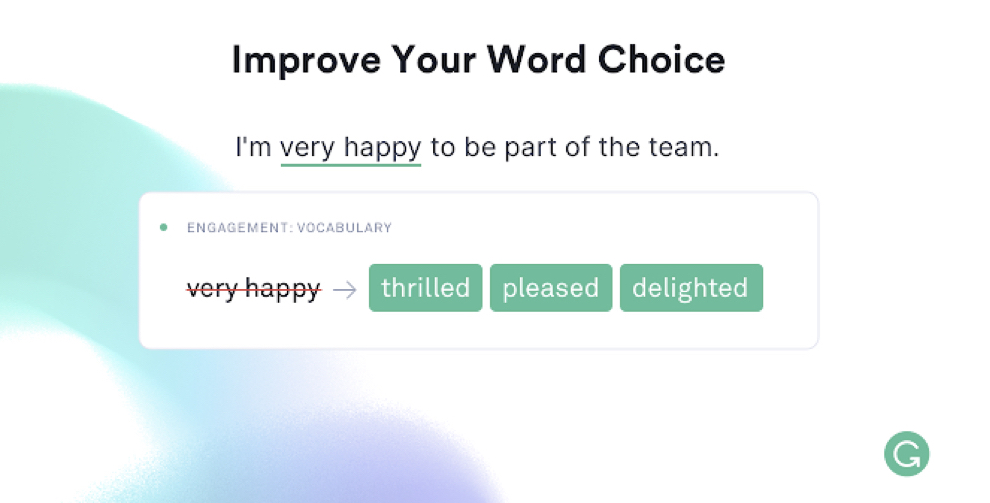
Grammarly: Your PhD writing assistant
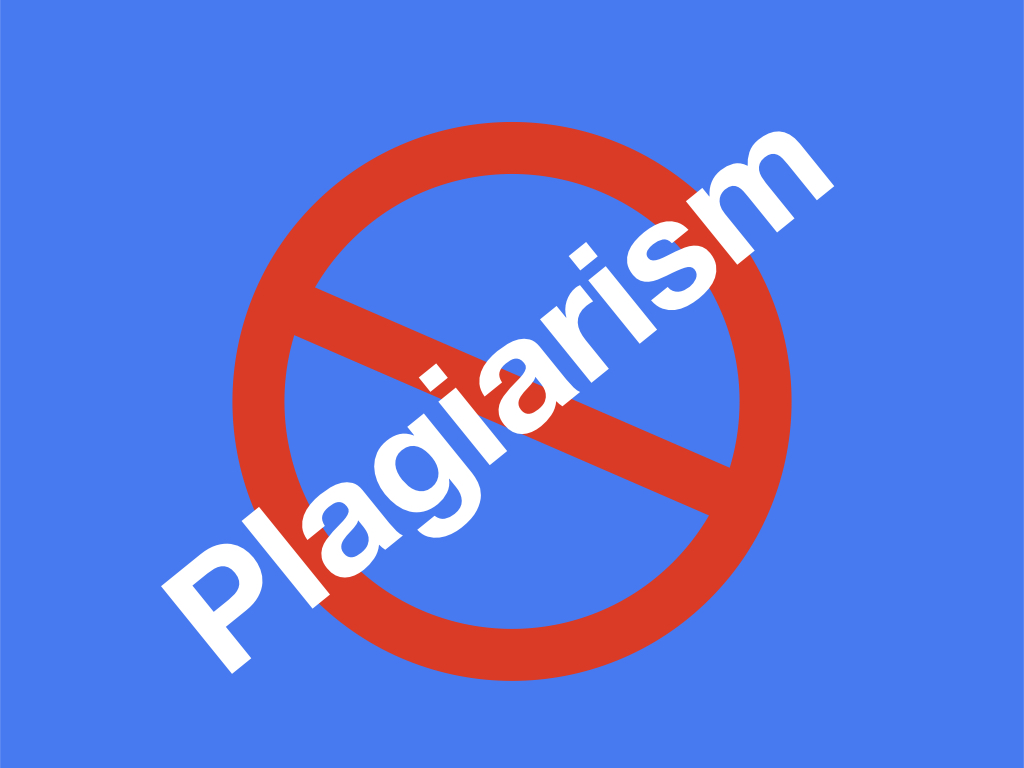
How to Avoid Plagiarism in Your PhD Thesis?
Leave a comment cancel reply.
Your email address will not be published. Required fields are marked *
Save my name, email, and website in this browser for the next time I comment.
Notify me of follow-up comments by email.
Notify me of new posts by email.
Thesis Apps: Best Applications & Software for Graduate Students
The process of writing a thesis requires a lot of time and patience. Custom-writing.org experts are willing to make this task easier for you. We’ve compiled a list of thesis writing apps and software. These tools will help you make plans and self-organize. There are also free apps to improve your productivity, help you carry out the research, boost your vocabulary, and check your work for mistakes.
With the thesis apps on this list, you won’t ever have to wonder how to write a dissertation because you’ll know the answer – it’s easy!
- 📑 Word Processors
- ⏰ Time Managers
- 🚀 Productivity Apps
- 🎓 Dictionaries
- 🔬 Research Tools
- 🔤 Grammar Checkers
1. 📑 Word Processors and Note-Taking Apps
This should be a no-brainer, but writing is one of the essential parts of creating a thesis. So it’s evident that you need to have the best thesis apps to deal with this task effectively.
Here are some apps that you might want to check out.
- Google docs . This is probably the first app that comes to mind when you think of alternative free word processors. It has all the functionality and capabilities you’ll need to write and format your thesis. It also allows users to work together on the same document in real-time. It’s available for Android, iOS, or as a web app.
- WPS Office . This multi-platform solution includes not only a word processor. It’s also a full-fledged office suite that allows you to create and work with spreadsheets, presentations, and PDF documents. What else could you need to create a perfect thesis?
- Office Online . This one is for those who want to get the most out of Microsoft Office for free. This one is as good as it can get — an online version of Office. Enough said.
- Jarte . This is a free word processor based on the WordPad engine. It has all the necessary functions and provides a comfortable way to work with text—and it’s free. This app also can export your documents to PDF and HTML files.
- Evernote , Google Keep , and OneNote . The reason why we put these three together? They’re all note-taking apps. Do we know that there are many other similar apps too? Yes, we do. But there’s a reason why these three are so popular. They all offer the same thing – a way to keep all your notes in one place. The difference between them is how it’s all organized, along with some extra features. All of these thesis writing apps are free, too.
2. ⏰ Time-Managing Thesis Apps
With all the steps you need to complete to write a good thesis, it’s not hard to get lost. You can quickly get stuck in one place without knowing what to do and end up making no progress at all.
Or you can use one of the dissertation apps in this category to build a plan and organize your workflow!
- Pocket . Pocket brings order to the chaos of posts and articles you want to read or use to write your thesis. You can easily save them all in one place and look through them later. Then you can decide whether or not you’ll need a particular piece of information.
- Todoist . This one is a free time manager (though it also has paid plans with extra features). With this app, you can set deadlines for each stage of your thesis creation process, and it will remind you of them beforehand. This app will help you stay on track of what plans are waiting for you next.
- Wunderlist . This to-do list app indeed does wonders. It lets you build short- and long-term plans and keep them all in order. You can set notifications to stay on track and always be sure that you’re performing according to your schedule, whether it’s a particular stage of your thesis writing or some other assignment.
3. 🚀 Thesis Apps to Improve Productivity
We all have days when things don’t work, and everything is a distraction. So how can you deal with this all-too-common problem?
There’s a good selection of productivity apps that can help you out. With one of these, you’ll finish writing your thesis in no time.
- Any.do . This one is a task manager that’ll help you stay on track of whatever your current tasks are. It will help you build a habit of reviewing your tasks and make sure that you know which assignments you need to pay the most attention to at the moment. With this app, you won’t miss deadlines or find yourself wondering what to do next.
- IFTTT . This tool allows you to create short automation sequences without any coding skills. It will remember every little thing that you tend to forget. On the one hand, you’ll get those things done; on the other—you won’t get distracted by those tasks and will be able to concentrate on what’s important right now. The app supports plenty of services and is easy to use.
- RescueTime . This app will track the time you spend completing tasks. It will also report all the websites you visit, the apps you use, and breaks you take during the day. By doing so, it helps you create greater self-awareness. As a result, you’ll immediately see whether something is going wrong and keeping you from following your plan.
- StayFocusd . This Chrome extension helps you stay focused on your current task (which, of course, explains its name). It will block all those distracting sites that tend to get in your way while you’re working. You can set a specific time for blocking or choosing a time limit for a certain time during the day.
- Write or Die . This one is a web-based tool. It is also available for iOS, with an Android version coming soon. The tool helps you eliminate writer’s block. Within the app, you can set a specific period and the word count you need to reach within this time. It also features stimuli and rewarding images.
4. 🎓 Vocabulary Boosters and Dictionaries
At this stage, dictionaries and vocabulary boosters come into play.
- Merriam-Webster Dictionary . This is one of the most well-known dictionaries out there. Apart from listing definitions and offering a thesaurus, it also features word games. These word games aim to increase your vocabulary, which will come in handy when writing a thesis. Apart from having a web-based version, there are also apps available for Android and iOS.
- Cambridge Dictionary . This is another famous dictionary listing almost every aspect and sphere imaginable. In long-term perspective, it’s even more useful than the best thesis statement generator , as it can potentially provide you with knowledge you’ll keep forever. All of the resources are available from the site, widget, or official mobile apps. A wide selection of available dictionaries and thesauruses will surely meet all of your writing needs.
- The Free Dictionary . There are many things to discover under this simple name. This web service provides dictionaries on a variety of topics. It also features a thesaurus, idioms, acronyms, a grammar book, and encyclopedia articles. What else can you ask for?
5. 🔬 Tools for Conducting Research
Another essential part of writing a thesis is research. Without properly researched sources and data , everything that’s written in your thesis will be highly questionable.
To avoid poorly supported arguments , and to be able to conduct outstanding research, consider using one of the following tools.
- Mendeley . Once you try this tool, you won’t believe that you ever researched without it. It will help you complete any type of research, come up with a topic for your paper, organize your literature review , make annotations, and manage your research materials. This multi-platform tool also allows syncing across all your devices.
- Mindmup , Bubbl.us . Both of these apps are great tools for mind mapping. They’ll help you get all of your thoughts and ideas in order. This organization will significantly help your research, as everything will be neatly organized and accessible. Both of these tools have free plans and web versions. They only differ with their extra features.
- WolframAlpha . This is a go-to source of expert knowledge on a wide variety of disciplines. This answer engine is also available on mobile platforms. Instead of just giving a list of documents or web pages that may or may not answer your question, it comes up with results from a curated knowledge base in response to your query.
6. 🔤 Grammar Checkers
Everyone makes mistakes. But it’s not a bad idea to make sure that there’s none in your thesis. The apps described below can help you with that.
- Hemingway Editor . This tool aims to improve your writing style and make it as straightforward as possible. It makes colored highlights to indicate long or very complicated sentences. As a result, you get a clean piece of content that’s understandable and easy to digest.
- Ginger . This multi-platform solution helps you find and correct all types of grammar mistakes. It also makes it easier to edit text, which improves your overall productivity, as you’ll spend less time correcting errors.
- Grammarly . This tool has gained so much popularity that it probably doesn’t even require an introduction. It finds and corrects mistakes that no word processor can spot. The tool has a browser extension, offline software, and a premium version with extra features.
Hopefully, you’ll get some thesis help by using these free tools. With these apps at your disposal, you’ll be able to craft a fantastic thesis easily.
Did we miss something? Are there any free thesis apps that you like to use that aren’t on this list? Tell us about them in the comments!
- Share to Facebook
- Share to Twitter
- Share to LinkedIn
- Share to email

A history project is one of the most fascinating and, at the same time, challenging assignments. The research process was especially complicated when there was no Internet. To investigate primary and secondary sources on history, students were spending long hours in the libraries. Nowadays, there are plenty of online resources...
![best phd thesis writing software 11 Basic Writing Rules – Common Mistakes & Fixes [2024 Upd.]](https://custom-writing.org/blog/wp-content/uploads/2020/12/people-performing-their-job-duties-coworking-space-284x153.jpg)
Getting your message across may seem a bit harder online than in real life. Though, a whole lot of methods, including audio tracks, videos, animations, and other visuals, are available for you at any second. And let’s not forget about good ol’ text. So, what do you do to win...

Every student is constantly looking for tried and true methods, tools, and techniques to make their study process more effective. And note taking on lectures and textbooks is a skill that no student can live without. Why?

The selection of websites in this article will help students cope with their everyday challenges easily and efficiently. Nowadays, the approach to teaching, learning and writing custom essay has undergone some changes. These are a few main qualities that modern education fosters so far: Creative and critical thinking skills,Interaction and...

How to make the most of your studying? What is the right balance between studying and having fun? Is it a good idea to work while being in college? We discussed those important questions with Ingrid Mosquera Gende, professor, blogger, and just a great person, and received valuable pieces of...

Are you dreading your upcoming test because you feel unprepared? Or are you simply looking to refresh and improve your test-taking skills? In this article by Custom-Writing.org experts, you’ll find a collection of excellent test-taking tips and strategies. Even if you only have one day to prepare for your test,...
![best phd thesis writing software Left Brain vs. Right Brain: Characteristics Chart [INFOGRAPHIC]](https://custom-writing.org/blog/wp-content/uploads/2020/12/left-right-brain-concept-284x153.jpg)
Neuroscientists and psychologists worldwide have put considerable effort into investigating the characteristics and functions of the left and right sides (the technical name is hemispheres) of the brain. Though the two sides of a human’s brain look alike, they process information very differently. Over the years, studies have consistently shown...

Bloom’s taxonomy is a set of hierarchical models that classify educational learning objectives. It divides them into levels that differ in their specificity and complexity. Students use it for better learning and understanding of a subject, while tutors incorporate it into teaching. As a result:This article will give you a...

Bloom’s taxonomy is a highly efficient educational system that helps to set and reach learning objectives. But how do you make it even more effective? Use apps! Modern technology gives us plenty of opportunities, so why not take advantage of it? Here, at Custom-Writing.org, we’ve selected 46 apps that can...

English grammar is similar to math. It has strict rules defined by the correlations of different parts of the sentence. Unlike many other languages, there is usually one correct variant of saying a sentence. But these rules are complicated and intricate only until you find a simple explanation. Now there...

Attention deficit hyperactivity disorder is the problem of millions of children and their parents worldwide. Fewer children keep symptoms when they become adults. But smaller numbers do not mean the absence of the problem. These people are inattentive, hyperactive-impulsive, or both. The subtypes of the disease are respectively called ADD,...

Essay Writing Contest by Custom-Writing.org has come to an end. During that exciting period, numerous students from all over the world voiced their opinions on topics concerning students’ writing skills, decreasing amount of homework, requirements of academic writing, and custom essay services. It was our first contest here at Custom-Writing.org,...
I need pure thesis
The Best Software for Writing Your Dissertation
By Lesley McCollum
You have / 5 articles left. Sign up for a free account or log in.
Lesley McCollum is PhD student in neuroscience at the University of Alabama at Birmingham. You can follow her on Twitter @lesleyamccollum.
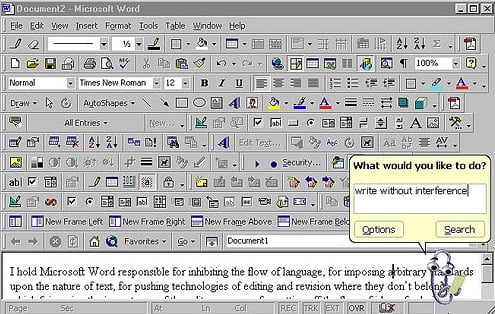
I’m writing this post in Microsoft Word. Chances are, it’s where you do a lot of your writing as well. It’s easy, convenient, familiar, and gets the job done for simple text documents. There are a lot of great features to MS Word if you want to (or have to) stick with it for your writing. If so, check out our previous post by Hanna on quick tricks for formatting in Word.
Some tasks call for a bit more than a basic word processor, though. If you’ve ever spent too many frustrating hours trying to format a Word document with multiple tables and figures (why does my figure keep moving halfway off the page?!), then you will likely agree that it’s not always the best to work with. As I embark on the dissertation-writing journey, I have been looking for an alternative to MS Word that is up for the job—something that can handle a large multi-chaptered document with robust formatting options.
The ideal software would be cheap (preferably free), fairly quick and painless to learn, and compatible with a reference/citation manager. One barrier to changing software is that my mentor likes using MS Word to edit my documents with the track changes feature. So a bonus would be that files could easily be converted to .docx to ease sending them to my PI for reviews. Here are a few non-Word options I have come across in my search for the best dissertation-writing software that seem to be favorites:
Windows, Mac OS X, Linux/Unix
LaTeX is an open-source document preparation system that was designed for scholarly and technical writing, and is great for handling large documents. It is a powerful and highly customizable typesetting system that, in contrast to MS Word, separates the content and document design. LaTeX is a markup language—it’s not exactly a programming language, but it does have similarities to coding. Because of this, there is definitely a learning curve when starting out. I was first exposed to LaTeX during college and used it to write my undergraduate thesis. It did take a while to learn, but has a huge amount of document support, and a great online community to answer just about any question you come across. The features I found that really made it worth the effort were its phenomenal job at handling mathematical equations, tables, and figures, and its own powerful reference manager BibTeX. Because it was designed to be used with LaTeX, they integrate perfectly and handle citations and cross-referencing effortlessly. One downside is that LaTeX does not export to .docx file format, so if you need a Word document for revisions or submission, there is no streamlined conversion from LaTeX. If you’re lucky, some schools provide LaTeX thesis templates already meeting the required specifications, so all you have to worry about is the content. Check out this great, detailed article on why you should use LaTeX for writing your dissertation.
If you are sold on the powerful and flexible typesetting available with LaTeX, but aren’t crazy about working solely with the markup language, a great compromise is LyX. It uses LaTeX in the background, but lets you write the content in a user interface similar to a word processor like MS Word. It still has all the advanced capabilities of LaTeX for mathematical equations and formatting, and integration with BibTeX. Other users have found that it doesn’t completely remove the need to understand LaTeX, but reduces the learning curve a bit. There are other programs that also provide a graphical editor for LaTeX such as Scientific Workplace or TeXmacs .
Mac OS X, Windows, Linux (beta)
Cost: $35-45 (free 30-day trial)
If you are a veteran GradHacker reader, you’ve likely seen Scrivener mentioned before, like here and here . In addition to standard word processing, Scrivener is great for project management and organization. It combines the visual appeal and ease-of-use that Macs are known for, and its users swear by it. It has a drag-and-drop interface, so a large document can be easily written in fragments, and provides a personal research database for easy storage of notes, folders, images (and just about anything else) that you collect as sources for your project. Another great feature of Scrivener is its compatibility with multiple file formats, making it easy to export in just about any document type. There are a couple of downsides for scientific writing, however. Scrivener lacks integration with reference management software—though users have found ways to handle citations, it doesn’t work seamlessly. It’s also not great for document layout containing formatted tables and figures. Check out this ProfHacker article on the values of Scrivener for academic writing.
An important note: don’t let the preparation of your dissertation get in the way of writing it . A complex document of this size could be edited and formatted forever, so don’t let that be a mode of procrastination! Try the software out, and it you don’t jive with it, stick with what works for you. Tools like these should only be sought if they will streamline the process for you, not hinder it. Adapt your writing software to meet the needs of your writing project. There isn’t always one perfect option—you may find that integrating multiple writing programs works best for the writing, compiling, and editing stages. Maybe all you really need is a distraction-free writing space to get the job done.
Check out these other helpful resources for finding an alternative to any software and for a detailed comparison of word processors .
What software are you using to write your dissertation, and what do you love about it? Please share it with us in the comments!
[Photo courtesy of Flickr user Ross Mayfield and used under a Creative Commons license.]

The Power of Confident and Impactful Communication
Scholars must convey complex concepts in ways that make an impression, write Diane A.
Share This Article
More from gradhacker.

5 Productivity Practices That Helped Me Finish My Dissertation

Summer Planning Strategies

Holding Pattern
- Become a Member
- Sign up for Newsletters
- Learning & Assessment
- Diversity & Equity
- Career Development
- Labor & Unionization
- Shared Governance
- Academic Freedom
- Books & Publishing
- Financial Aid
- Residential Life
- Free Speech
- Physical & Mental Health
- Race & Ethnicity
- Sex & Gender
- Socioeconomics
- Traditional-Age
- Adult & Post-Traditional
- Teaching & Learning
- Artificial Intelligence
- Digital Publishing
- Data Analytics
- Administrative Tech
- Alternative Credentials
- Financial Health
- Cost-Cutting
- Revenue Strategies
- Academic Programs
- Physical Campuses
- Mergers & Collaboration
- Fundraising
- Research Universities
- Regional Public Universities
- Community Colleges
- Private Nonprofit Colleges
- Minority-Serving Institutions
- Religious Colleges
- Women's Colleges
- Specialized Colleges
- For-Profit Colleges
- Executive Leadership
- Trustees & Regents
- State Oversight
- Accreditation
- Politics & Elections
- Supreme Court
- Student Aid Policy
- Science & Research Policy
- State Policy
- Colleges & Localities
- Employee Satisfaction
- Remote & Flexible Work
- Staff Issues
- Study Abroad
- International Students in U.S.
- U.S. Colleges in the World
- Intellectual Affairs
- Seeking a Faculty Job
- Advancing in the Faculty
- Seeking an Administrative Job
- Advancing as an Administrator
- Beyond Transfer
- Call to Action
- Confessions of a Community College Dean
- Higher Ed Gamma
- Higher Ed Policy
- Just Explain It to Me!
- Just Visiting
- Law, Policy—and IT?
- Leadership & StratEDgy
- Leadership in Higher Education
- Learning Innovation
- Online: Trending Now
- Resident Scholar
- University of Venus
- Student Voice
- Academic Life
- Health & Wellness
- The College Experience
- Life After College
- Academic Minute
- Weekly Wisdom
- Reports & Data
- Quick Takes
- Advertising & Marketing
- Consulting Services
- Data & Insights
- Hiring & Jobs
- Event Partnerships
4 /5 Articles remaining this month.
Sign up for a free account or log in.
- Create Free Account
- Resources Home 🏠
- Try SciSpace Copilot
- Search research papers
- Add Copilot Extension
- Try AI Detector
- Try Paraphraser
- Try Citation Generator
- April Papers
- June Papers
- July Papers

AI for thesis writing — Unveiling 7 best AI tools

Table of Contents
Writing a thesis is akin to piecing together a complex puzzle. Each research paper, every data point, and all the hours spent reading and analyzing contribute to this monumental task.
For many students, this journey is a relentless pursuit of knowledge, often marked by sleepless nights and tight deadlines.
Here, the potential of AI for writing a thesis or research papers becomes clear: artificial intelligence can step in, not to take over but to assist and guide.
Far from being just a trendy term, AI is revolutionizing academic research, offering tools that can make the task of thesis writing more manageable, more precise, and a little less overwhelming.
In this article, we’ll discuss the impact of AI on academic writing process, and articulate the best AI tools for thesis writing to enhance your thesis writing process.
The Impact of AI on Thesis Writing
Artificial Intelligence offers a supportive hand in thesis writing, adeptly navigating vast datasets, suggesting enhancements in writing, and refining the narrative.
With the integration of AI writing assistant, instead of requiring you to manually sift through endless articles, AI tools can spotlight the most pertinent pieces in mere moments. Need clarity or the right phrasing? AI-driven writing assistants are there, offering real-time feedback, ensuring your work is both articulative and academically sound.
AI tools for thesis writing harness Natural Language Processing (NLP) to generate content, check grammar, and assist in literature reviews. Simultaneously, Machine Learning (ML) techniques enable data analysis, provide personalized research recommendations, and aid in proper citation.
And for the detailed tasks of academic formatting and referencing? AI streamlines it all, ensuring your thesis meets the highest academic standards.
However, understanding AI's role is pivotal. It's a supportive tool, not the primary author. Your thesis remains a testament to your unique perspective and voice.
AI for writing thesis is there to amplify that voice, ensuring it's heard clearly and effectively.
How AI tools supplement your thesis writing
AI tools have emerged as invaluable allies for scholars. With just a few clicks, these advanced platforms can streamline various aspects of thesis writing, from data analysis to literature review.
Let's explore how an AI tool can supplement and transform your thesis writing style and process.
Efficient literature review : AI tools can quickly scan and summarize vast amounts of literature, making the process of literature review more efficient. Instead of spending countless hours reading through papers, researchers can get concise summaries and insights, allowing them to focus on relevant content.
Enhanced data analysis : AI algorithms can process and analyze large datasets with ease, identifying patterns, trends, and correlations that might be difficult or time-consuming for humans to detect. This capability is especially valuable in fields with massive datasets, like genomics or social sciences.
Improved writing quality : AI-powered writing assistants can provide real-time feedback on grammar, style, and coherence. They can suggest improvements, ensuring that the final draft of a research paper or thesis is of high quality.
Plagiarism detection : AI tools can scan vast databases of academic content to ensure that a researcher's work is original and free from unintentional plagiarism .
Automated citations : Managing and formatting citations is a tedious aspect of academic writing. AI citation generators can automatically format citations according to specific journal or conference standards, reducing the chances of errors.
Personalized research recommendations : AI tools can analyze a researcher's past work and reading habits to recommend relevant papers and articles, ensuring that they stay updated with the latest in their field.
Interactive data visualization : AI can assist in creating dynamic and interactive visualizations, making it easier for researchers to present their findings in a more engaging manner.
Top 7 AI Tools for Thesis Writing
The academic field is brimming with AI tools tailored for academic paper writing. Here's a glimpse into some of the most popular and effective ones.
Here we'll talk about some of the best ai writing tools, expanding on their major uses, benefits, and reasons to consider them.
If you've ever been bogged down by the minutiae of formatting or are unsure about specific academic standards, Typeset is a lifesaver.
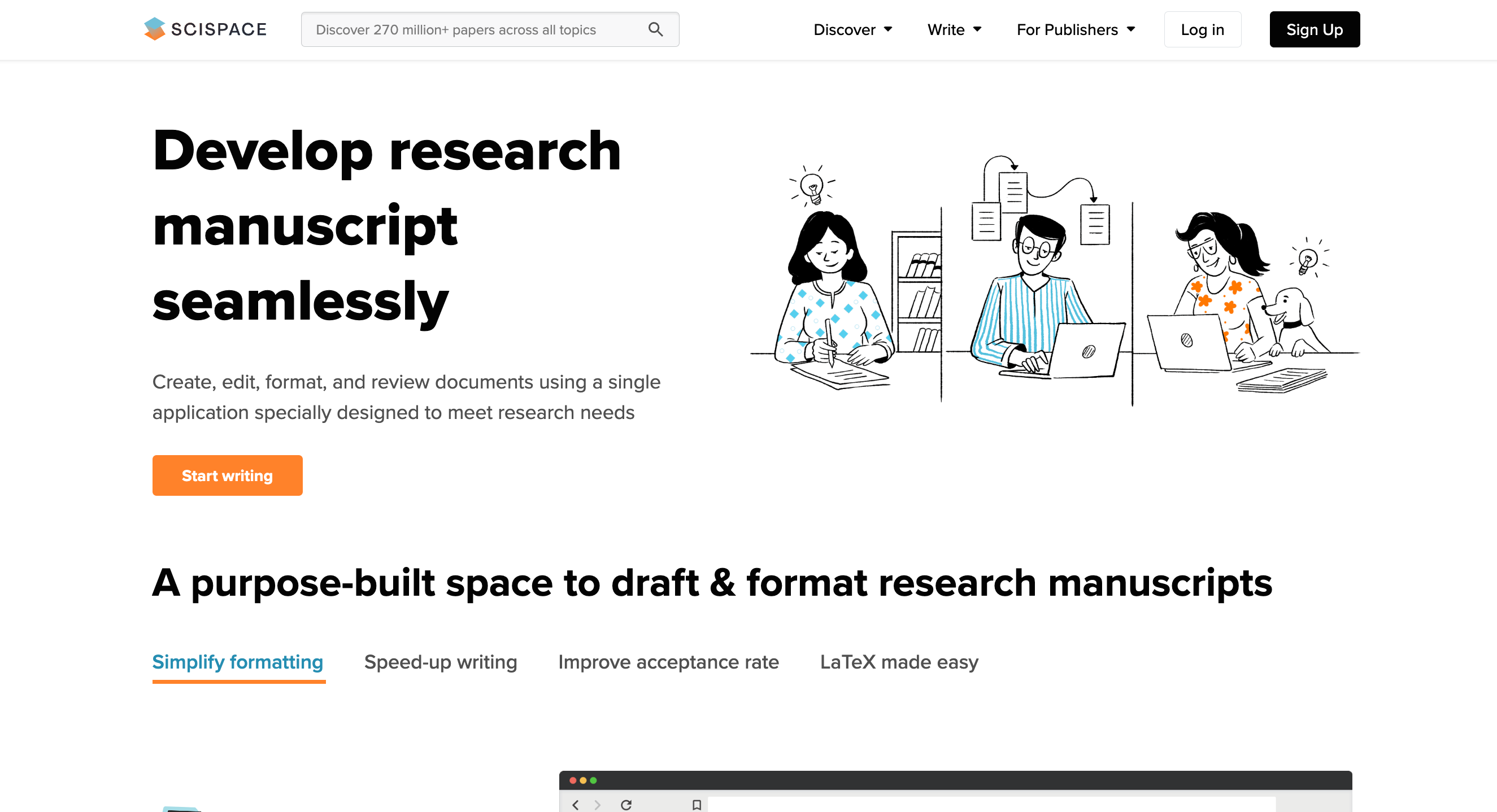
Typeset specializes in formatting, ensuring academic papers align with various journal and conference standards.
It automates the intricate process of academic formatting, saving you from the manual hassle and potential errors, inflating your writing experience.
An AI-driven writing assistant, Wisio elevates the quality of your thesis content. It goes beyond grammar checks, offering style suggestions tailored to academic writing.
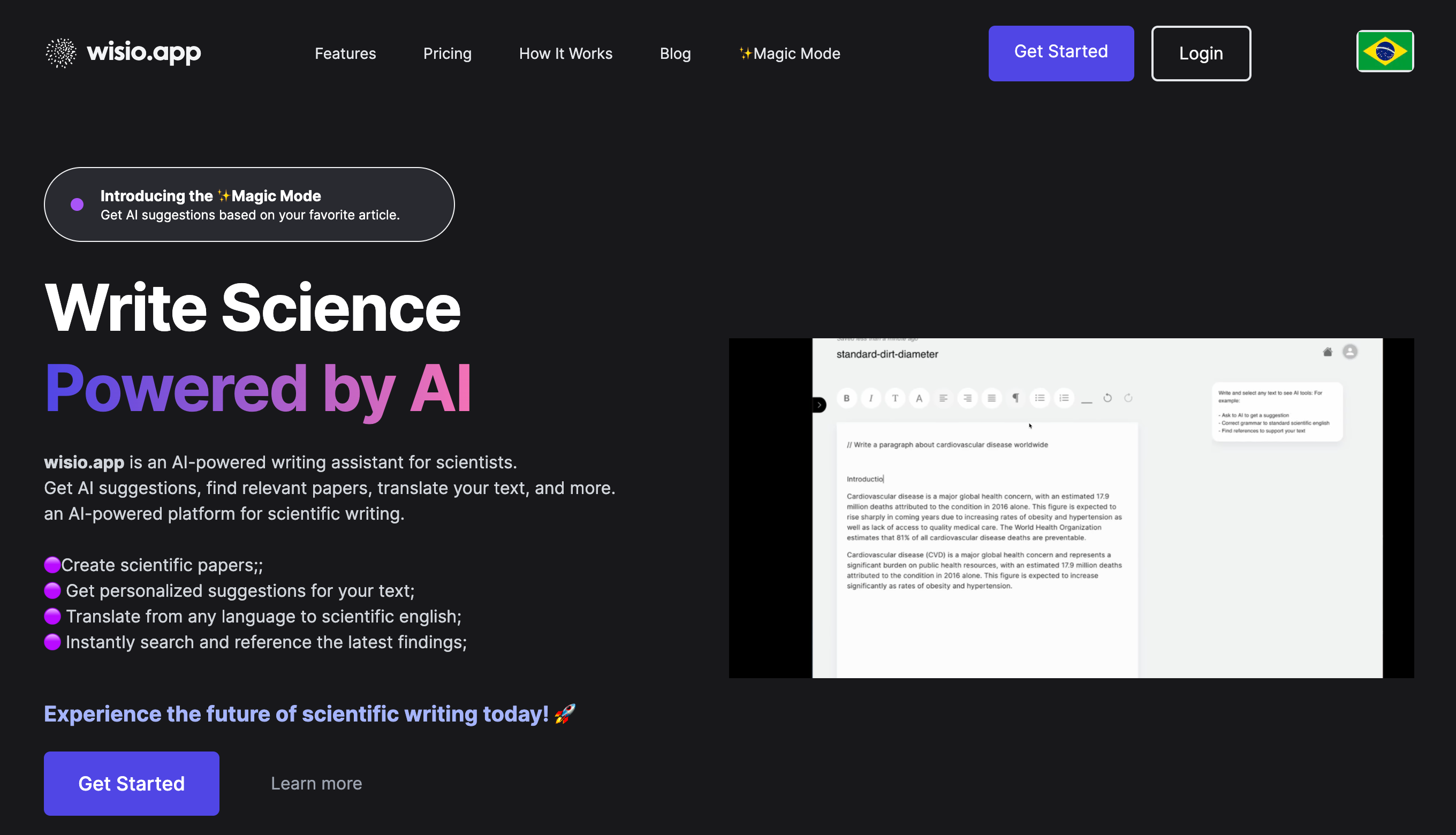
This ensures your thesis is both grammatically correct and maintains a scholarly tone. For moments of doubt or when maintaining a consistent style becomes challenging, Wisio acts as your personal editor, providing real-time feedback.
Known for its ability to generate and refine thesis content using AI algorithms, Texti ensures logical and coherent content flow according to the academic guidelines.
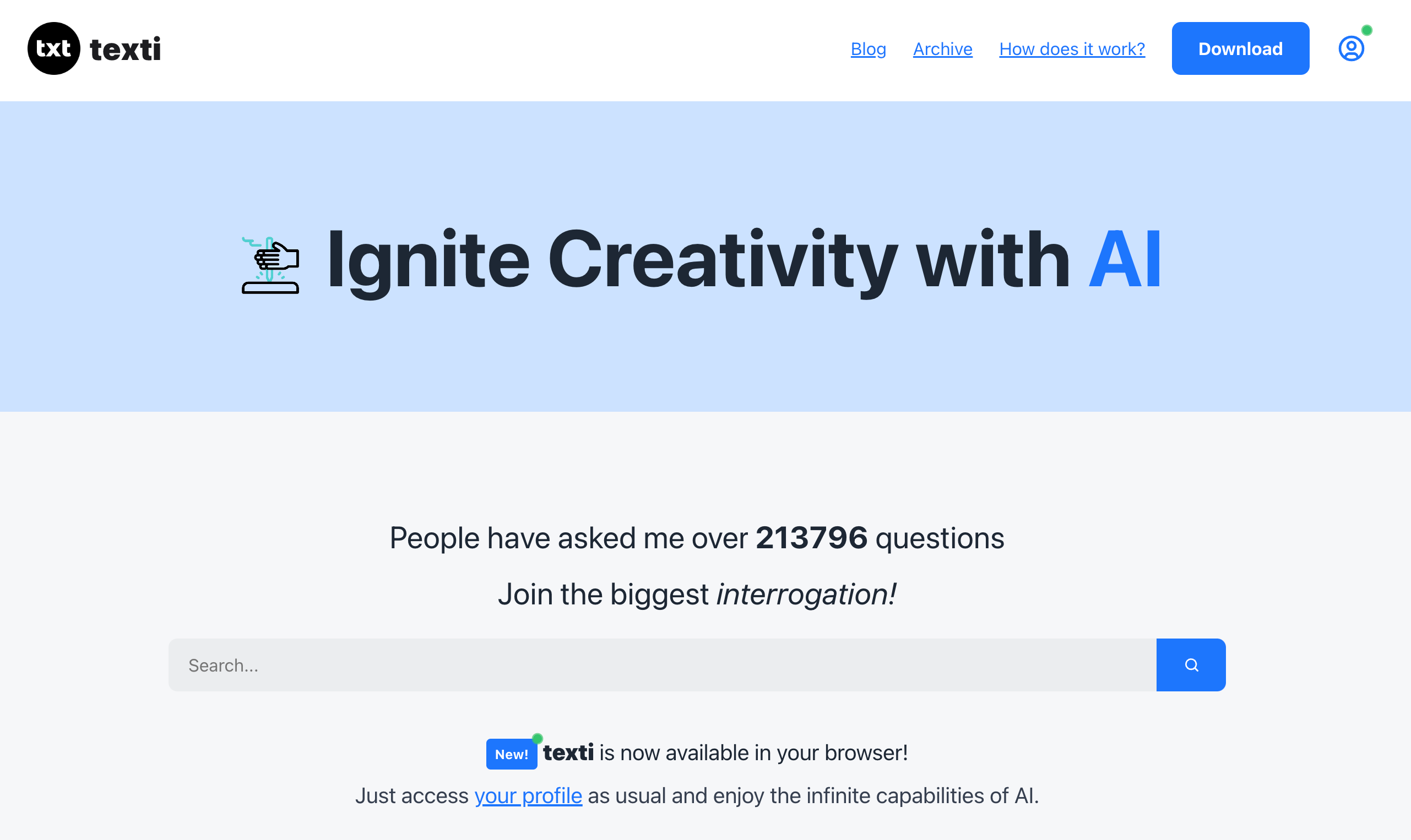
When faced with writer's block or a blank page, Texti can jumpstart your thesis writing process, aiding in drafting or refining content.
JustDone is an AI for thesis writing and content creation. It offers a straightforward three-step process for generating content, from choosing a template to customizing details and enjoying the final output.
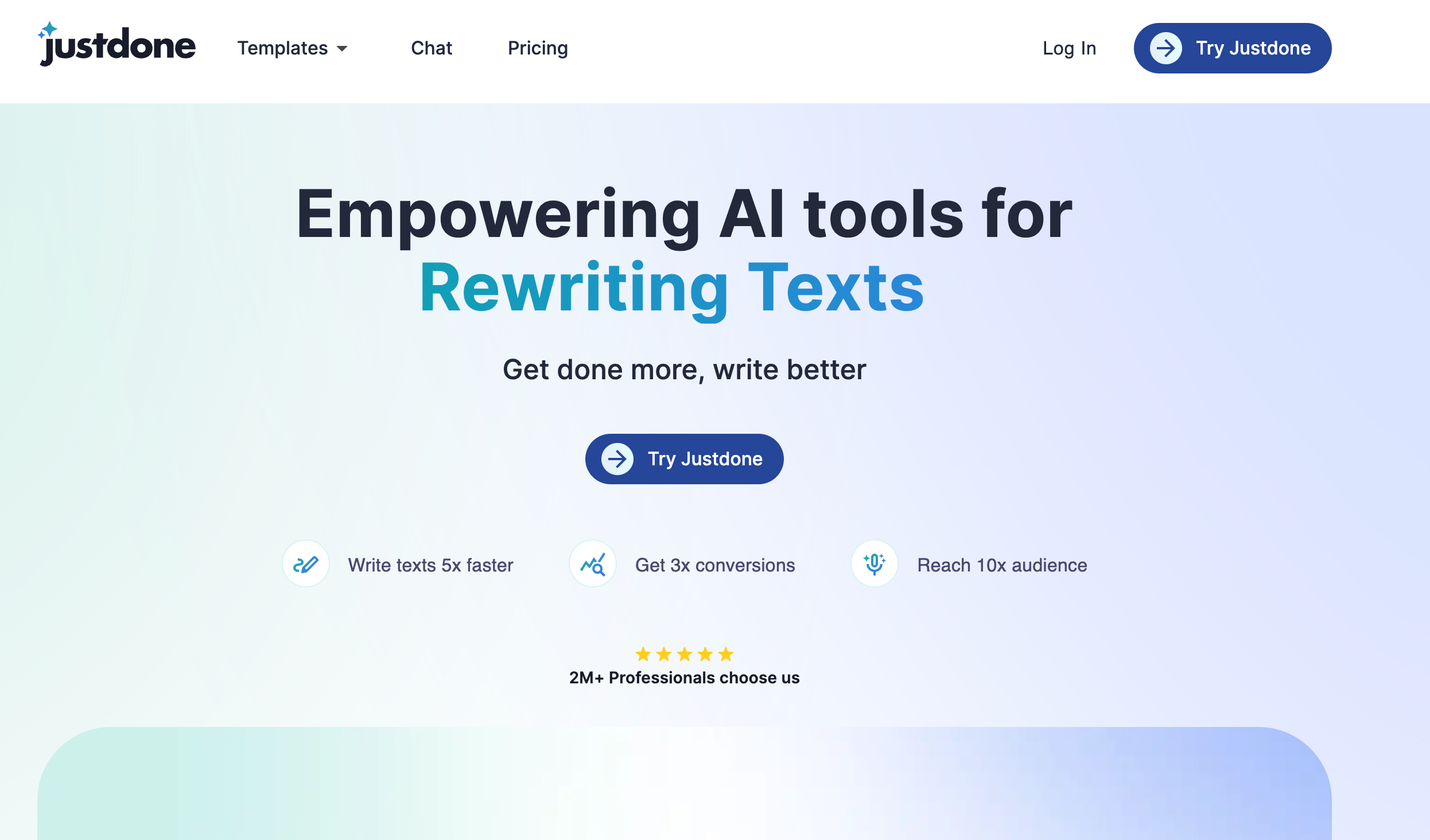
JustDone AI can generate thesis drafts based on the input provided by you. This can be particularly useful for getting started or overcoming writer's block.
This platform can refine and enhance the editing process, ensuring it aligns with academic standards and is free from common errors. Moreover, it can process and analyze data, helping researchers identify patterns, trends, and insights that might be crucial for their thesis.
Tailored for academic writing, Writefull offers style suggestions to ensure your content maintains a scholarly tone.
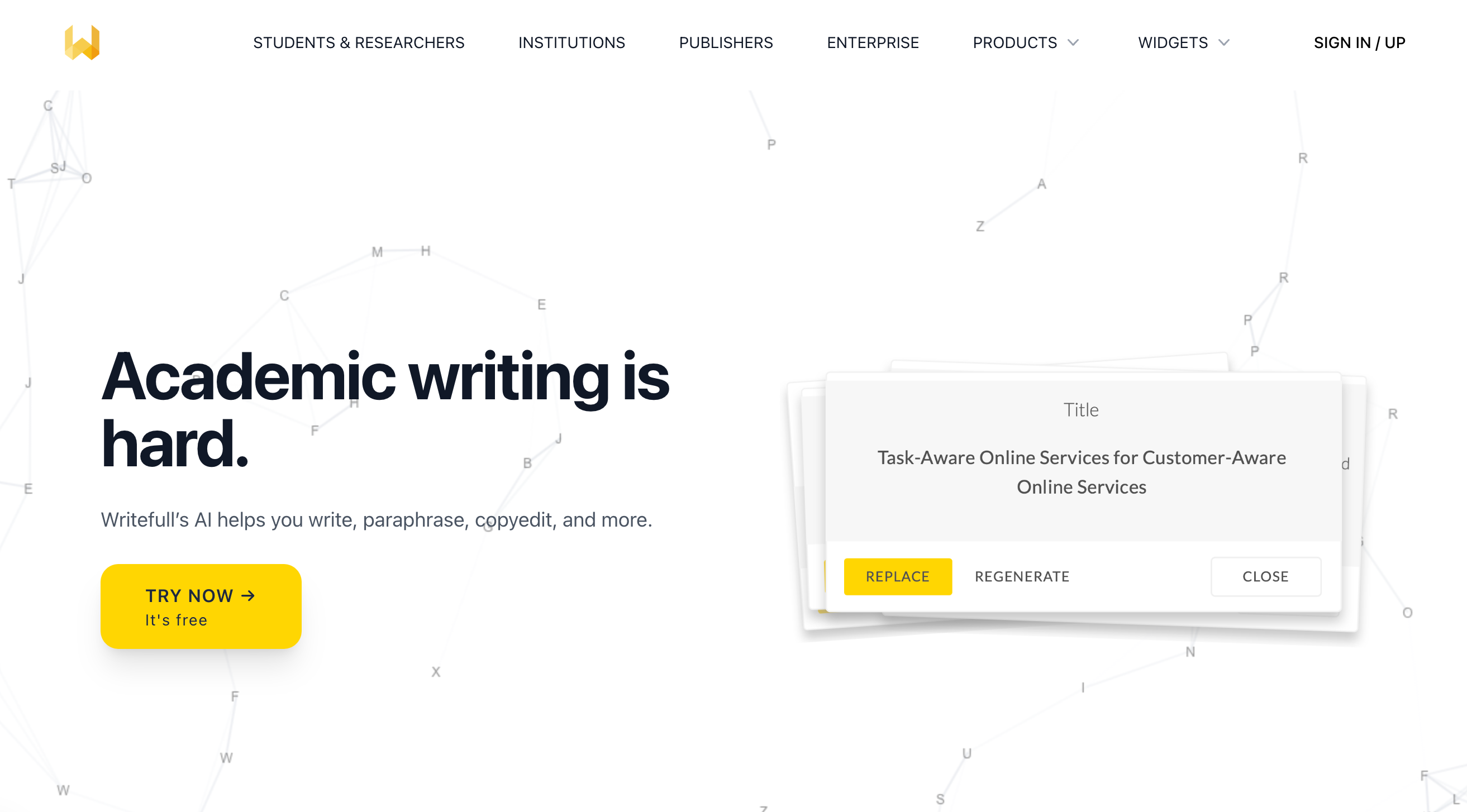
This AI for thesis writing provides feedback on your language use, suggesting improvements in grammar, vocabulary, and structure . Moreover, it compares your written content against a vast database of academic texts. This helps in ensuring that your writing is in line with academic standards.
Isaac Editor
For those seeking an all-in-one solution for writing, editing, and refining, Isaac Editor offers a comprehensive platform.
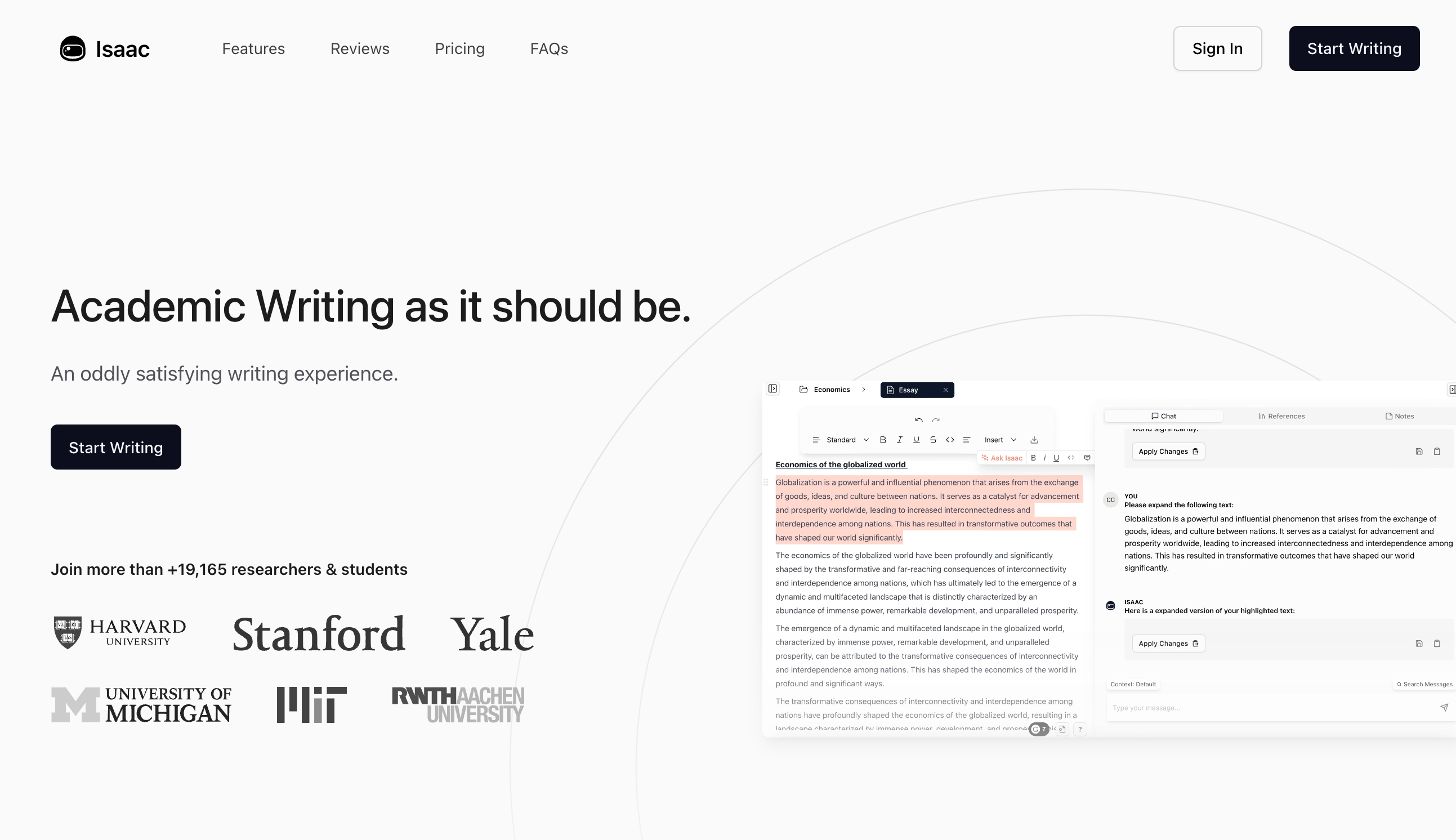
Combining traditional text editor features with AI, Isaac Editor streamlines the writing process. It's an all-in-one solution for writing, editing, and refining, ensuring your content is of the highest quality.
PaperPal , an AI-powered personal writing assistant, enhances academic writing skills, particularly for PhD thesis writing and English editing.
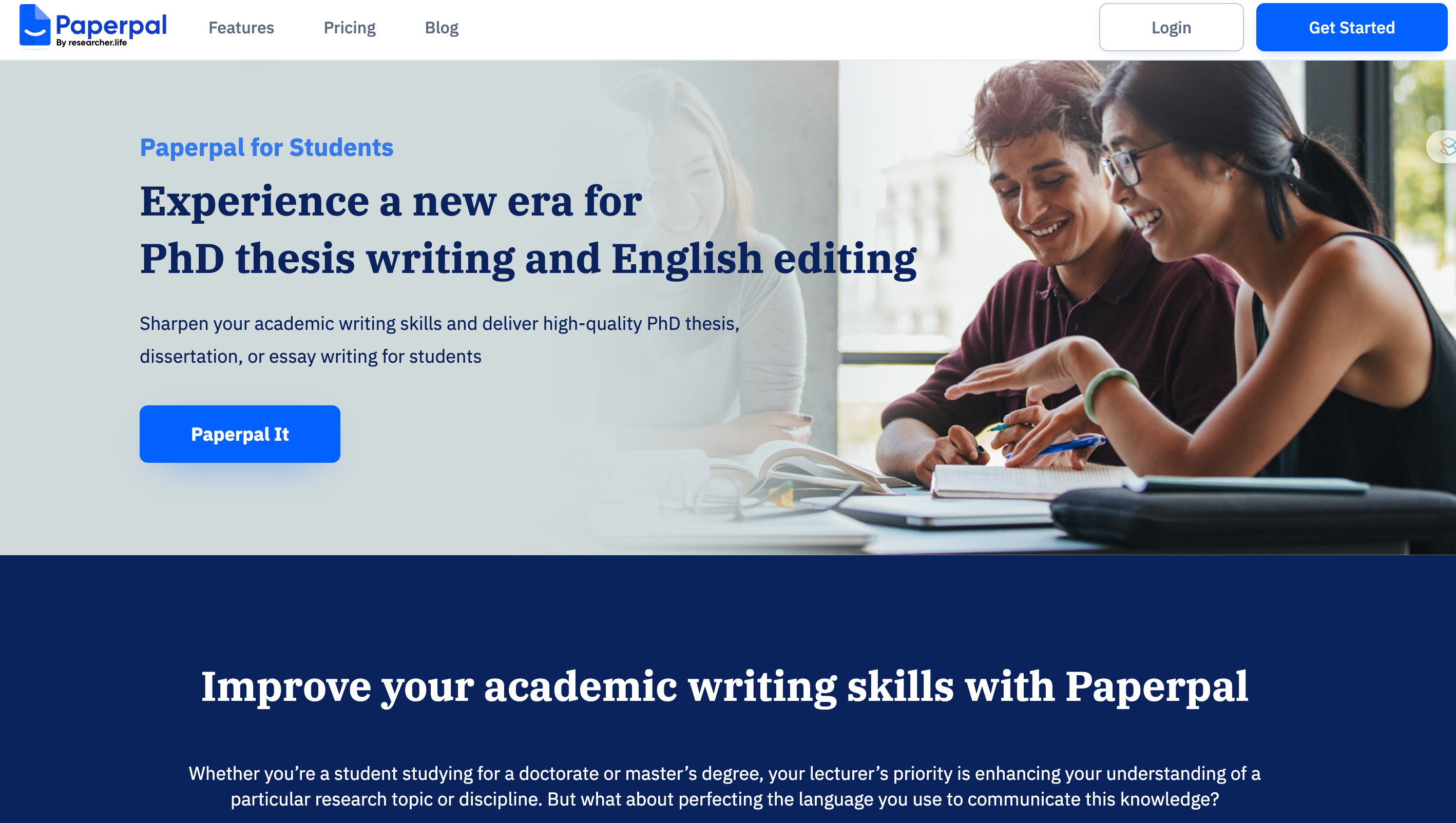
This AI for thesis writing offers comprehensive grammar, spelling, punctuation, and readability suggestions, along with detailed English writing tips.
It offers grammar checks, providing insights on rephrasing sentences, improving article structure, and other edits to refine academic writing.
The platform also offers tools like "Paperpal for Word" and "Paperpal for Web" to provide real-time editing suggestions, and "Paperpal for Manuscript" for a thorough check of completed articles or theses.
Is it ethical to use AI for thesis writing?
The AI for writing thesis has ignited discussions on authenticity. While AI tools offer unparalleled assistance, it's vital to maintain originality and not become overly reliant. Research thrives on unique contributions, and AI should be a supportive tool, not a replacement.
The key question: Can a thesis, significantly aided by AI, still be viewed as an original piece of work?
AI tools can simplify research, offer grammar corrections, and even produce content. However, there's a fine line between using AI as a helpful tool and becoming overly dependent on it.
In essence, while AI offers numerous advantages for thesis writing, it's crucial to use it judiciously. AI should complement human effort, not replace it. The challenge is to strike the right balance, ensuring genuine research contributions while leveraging AI's capabilities.
Wrapping Up
Nowadays, it's evident that AI tools are not just fleeting trends but pivotal game-changers.
They're reshaping how we approach, structure, and refine our theses, making the process more efficient and the output more impactful. But amidst this technological revolution, it's essential to remember the heart of any thesis: the researcher's unique voice and perspective .
AI tools are here to amplify that voice, not overshadow it. They're guiding you through the vast sea of information, ensuring our research stands out and resonates.
Try these tools out and let us know what worked for you the best.
Love using SciSpace tools? Enjoy discounts! Use SR40 (40% off yearly) and SR20 (20% off monthly). Claim yours here 👉 SciSpace Premium
Frequently Asked Questions
Yes, you can use AI to assist in writing your thesis. AI tools can help streamline various aspects of the writing process, such as data analysis, literature review, grammar checks, and content refinement.
However, it's essential to use AI as a supportive tool and not a replacement for original research and critical thinking. Your thesis should reflect your unique perspective and voice.
Yes, there are AI tools designed to assist in writing research papers. These tools can generate content, suggest improvements, help with formatting, and even provide real-time feedback on grammar and coherence.
Examples include Typeset, JustDone, Writefull, and Texti. However, while they can aid the process, the primary research, analysis, and conclusions should come from the researcher.
The "best" AI for writing papers depends on your specific needs. For content generation and refinement, Texti is a strong contender.
For grammar checks and style suggestions tailored to academic writing, Writefull is highly recommended. JustDone offers a user-friendly interface for content creation. It's advisable to explore different tools and choose one that aligns with your requirements.
To use AI for writing your thesis:
1. Identify the areas where you need assistance, such as literature review, data analysis, content generation, or grammar checks.
2. Choose an AI tool tailored for academic writing, like Typeset, JustDone, Texti, or Writefull.
3. Integrate the tool into your writing process. This could mean using it as a browser extension, a standalone application, or a plugin for your word processor.
4. As you write or review content, use the AI tool for real-time feedback, suggestions, or content generation.
5. Always review and critically assess the suggestions or content provided by the AI to ensure it aligns with your research goals and maintains academic integrity.
You might also like

What is a thesis | A Complete Guide with Examples

Software for Writing a PhD Thesis
There are four categories of software for thesis writing: (1) project organizing; (2) word-processing; (3) bibliographic organization; and (4) specialty software. Here are some of the best programs, along with those I find essential to my PhD thesis and scholarly writing workflow.
[UPDATED 2 February 2019 – And I have successfully completed the PhD! Hooray! ]
Now I’ll be using a macbook pro for the task, but many of the software programs I mentioned can run on mac or pc (though some run better on one or the other).
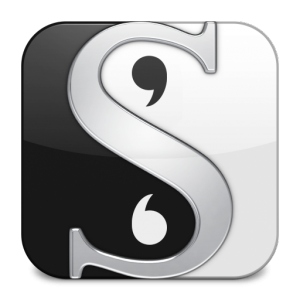
Proje ct organizing/note taking.
Some might use a word-processing program for this while others might find a specialized program instead. I’ve heard of many people using Evernote , a free program I also have and like okay but use very little. (If you use Evernote, you must consider Brett Kelly’s guide, Evernote Essentials! ) There’s also MS OneNote, Simplenote, and Springpad (see a review of these here ).
I’ve decided on a more complicated yet powerful program, Scrivener . It’s difficult to describe what this program does in few words. It is similar to a word-processor–it in fact has a streamlined word processor as a main feature. But it is much more. It allows you to compose, organize and edit a complicated project (like a dissertation, book, or screenplay), its various chapters (or documents), notes and relevant documents (pdfs of articles, summary notes or quotes, etc.), among other things. Learning the program takes an initial investment in time (perhaps a Saturday morning), but the tutorial document walks you through the program’s main features quite nicely. I think this might be the single most powerful program I’ve been using in writing my thesis. In fact, I now have dozens of projects in Scrivener, from academic projects to business ventures. I love it.
So why use this and a word processor? For me, Scrivener’s real power is in the research/note-taking, initial composition and organization–especially organization!–phase of thesis work. While using Scrivener will add a step to the process (as opposed to using Word from the start), I Scrivener saves me time in the long run.
Scrivener is very affordable and they offer great customer support. Here are your four options for when you’re ready to purchase (education licenses are discounted):
Scrivener 3 for Mac OS X (Education Licence) Scrivener 3 for Mac OS X (Regular Licence) Scrivener for Windows (Education Licence) Scrivener for Windows (Regular Licence)
Though I’ve not used it, the Dummies guide for Scrivener has excellent reviews for those wanting more help.
File Syncing/Backup
While more a ‘service’ than ‘software’, consider a plan for backing up the files you create with all this software! I recommend a physical home back up solution that you perform at least monthly (preferably more often) in addition to a cloud backup of your most important files. For the latter, DropBox is my choice– sign up for free !
Word-processing.
One must, after all, be able to compose, format, and publish the thesis. Some use Scrivener for this (see above), and that is an option. Other opt for Microsoft Word ( amzn ). While Pages for Mac has some nice features, OpenOffice is capable, too, and I’ve heard a few, mostly those working with the Hebrew language extensively, recommend Mellel ( amzn ) I have years of experience on Word and it is very widely used. Further, the University of Michigan Library has published a pdf online entitled “ Using Microsoft Word 2011 (Mac) for Your Dissertation ” to help! If you’re using Word for Mac for academic writing, it’s a must-read.

Bibliography organization.
Various programs on the market today specialize in organizing bibliographic data and integrating this data easily into word-processing documents. The top two I’ve heard people using are EndNote ( amzn ), and Zotero (one might add Nota Bene or Sente). I’ve only used Zotero, but its powerful, efficient, easy to learn/use, and costs nothing! I won’t be looking elsewhere. It also powerfully integrates into Word (for Windows or PC). I can also use it with Scrivener, my organizational and initial composition program. For a video on the power of Zotero for a theological library, see Andy Naselli’s helpful blog post here .
A lot of research goes into thesis writing. Let me introduce you to a web tool I’ve created to help: reSearch Engine . Just enter a search term, press enter, and presto.
Specialty Software.

I have and use all three and each has its pros and cons. I will likely use Accordance for my “quick and dirty” searching and copy-pasting of ancient languages. Of course, its a powerful program that can do intense searches, and I will likely use it for this when such searches are needed. Logos is my go to program for secondary resources, especially exegetical commentaries and quick referencing church fathers or other ancient sources. Logos has not just saved me money on print books, it has saved me from needing multiple book shelves!
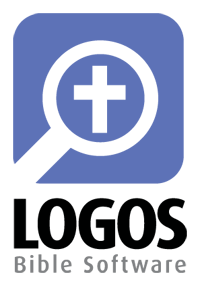
I’d be happy to hear what others are using and find helpful.
106 Responses to Software for Writing a PhD Thesis
What I can’t seem to figure out is how to load ZOTERO on my MAC. I did it once a while back, but have a new computer now. I spent a couple hours once trying to download it and make it work… no joy 🙁 a post on where/how to install would help me… I may be hopeless, I still like binders and paper copies to organize research by chapter…
John Mark, good to hear from you! Do you remember when this was you tried to load it and whether it was the version that runs in the Firefox web browser or the stand-alone version? I’m now using the stand-alone version for mac which functions like a normal app. The other version I used (which is still available) was actually an extension in Firefox and, as I recall, was loaded differently. Here’s the Zotero download page –you’ll see the stand-alone versions down the page a bit. If you happen to have used one version or there other (or both), your library is sync-able, one to the other. I hope that helps a little.
> OpenOffice is capable, too
The development of OpenOffice has been stalled for a while, since its sponsoring company (Oracle) dropped it and its new home (Apache) is still trying to get organized. LibreOffice is its main successor, with an active development community and several new releases. I enjoy LibreOffice and have been using it for a study I’ve been writing over the last year (currently 60+ pages).
David, thanks for commenting–it’s been a while since we’ve talked! I wasn’t aware of the circumstances of development you’ve mentioned. I’ve used OpenOffice just a bit on Ubuntu, but since I already had Word, I wasn’t motivated enough to invest time into it (nor Ubuntu for the matter). Sounds like LibreOffice is serving your needs quite well. I’ll have to give it a look.
Josh, Take a look at http://www.ActiveScholar.com for an all-in-one application, designed by academics for academics: ResearchWriter. Love to hear your comments.
This looks interesting, but perhaps you can tell me how it is superior to Scrivener or other alternatives? It looks like the special pricing for your product is still twice the cost of Scrivener, and, correct me if I’m wrong, yours requires the user to also use MS Word?
I don’t know much about ActiveScholar, but from fiddling with it for about 5 minutes, I would instead recommend the free, more robust Citavi. Citavi is WONDERFUL and easily surpasses ActiveScholar, from what I can see. One can watch Citavi videos at http://www.citavi.com/ . Note: Citavi is for Windows computers, and if you want to run it on a Mac, you’d have to run Windows on your Mac.
Have you had a chance to use Scrivener?
[…] while back I mentioned using Scrivener for writing a thesis. Thought I’d share a few more thoughts on what I’ve enjoyed about it this […]
Don’t forget Mendeley for bibliography organization…it’s the best! mendeley.com/
In what ways do you think medeley is better than Zotero?
+1 to Mendeley.
I have tried all of them–Zotero, Endnote, etc., etc. Mendeley wins HANDS DOWN! The one and only, ONLY thing Zotero may do better than Mendeley is handle web snippets better than does Mendeley. Maybe. I haven’t tried to hard to deal with web snippets in Mendeley. I have gotten around this by using the snippet program provided on my laptop, saving my snippet in PDF format, and storing it in Mendeley. Also, snippets can also easily be stored in Citavi (another program worth a serious gander for Windows users or those willing to run Windows on their Mac). I tweak my academic workflow periodically, and at the moment Mendeley and Citavi are essential to my workflow. Citavi allows you to manage your note-taking and bibliography generation near flawlessly. I do not use Mendeley for bibliography generation, just FYI.
Some of what it is about Mendeley: the deep searching capability; the ability to annotate and note take and tag and key . . . all while leaving the PDF clean; the collaborative capabilities; the backup; the simplicity of syncing between its desktop and web versions . . . I could go on.
Once reason I can’t leave Mendeley: Say I vaguely remember an article I collected, but not too well. Perhaps I remember that it was about Peirce and Radford and algebra. Mendeley will allow me to quickly, quickly see which of the 1000+ PDF articles or book excerpts in the collection contain these three words. Then I can open and search the PDFs side-by-side, and deeply.
Mendeley and Zotero do “speak with one another,” from what I’ve read. However, I only deal with Mendeley and Citavi for source management. I blog a bit about this. 🙂 It’s a great topic.
Thanks for sharing your experience. Using Scrivener and Zotero, it seems I can get similar results as you describe here, though since I have not tried it with Mendeley and Citavi, I can’t offer a comparison. One difference appears to be Mendeley’s ability to handle pdfs, especially in annotating, etc. I can’t imagine the “time saving factor” is too different, but of course it all depends on what exactly you’re doing.
Thank you. This is so helpful!
Glad you found it helpful!
As PhD you must use latex document preparation system.
Perhaps in Math related studies, but this isn’t true across the board, esp. in humanities.
Can you import fonts into Scrivener (e.g., Greek and Hebrew fonts)?
So far as I know, Scrivener is able to use all (or at least most) the fonts you have installed on your system, including Greek and Hebrew. I copy and paste a lot of my Greek and Hebrew in unicode, and I’ve had no issues with them in Scrivener.
I’m just diving in to the writing of my dissertation (DBA) and I’m curious as to what “original language research” is. Is this specific to your topic? or do all research projects entail some form of original language research to some degree?
Excellent post by thew way, I definitely think that Scrivner looks promising.
i study theater literature in masters degree in iran.i wanna know which software is best for me to use. i should be compatible with office word and i can use persian font in it…what kind of software do you suggest?? is zotero good?can i use persian font in it?…my operating system is windows 7.
I need this organisation to help me out on how to write thesis and dissertation
How about instead of Scrivener, you go with Evernote!
I have Evernote, but just haven’t found it as useful as many say it is. If your primary purpose is note taking, data organization, etc., then Evernote is probably great. Scrivener offers a lot of other organization and word-processing features. I’m sure the two could be incorporated together fairly effectively, too.
Indeed, Evernote is great to take note and organize your digital information (the notes, pdfs or any type of digital information). However, it is a poor word processor and I would never recommend its use for that purpose!
Agreed, Michel. I am using Evernote more now than I used to, primarily for record keeping.
thanks so much respect
My pleasure.
[…] my previous post I discussed some of the software choices I’ve made for working on a PhD thesis. This evening […]
[…] By the way, I’ve begun gathering information and advice to incorporate in an ebook for anyone interested in better writing (e.g., theses, essays, etc.). The goal is to be thorough yet concise. Topics include research, organization, writing style, process of writing, and technological aids (software, web, etc.). If you want to hear when its finished, sign up below. If not, no worries! See also: writing software recommendations. […]
I have developed a thesis writing software in the true meaning. Have a look at my site. My software helps you to create the thesis title, thesis statement, research questions, hypothesis tests and conclusion. See my audio and video descriptions.
@ Joshua L. Mann i am a ph.d researcher and i want to know is there any good free version software that can do all my thesis writing work like bibilography organisation, chapter preparations etc.
Vinay, for bibliography management, I use a free program called Zotero (see links above). For writing, one of the better free word processors is part of the Open Office software (google it). I assume at this point in your education you have written a fair bit, so I would consider sticking with the word processor you feel most comfortable with, so long as it can handle your subject, field, etc. If it is a matter of money, talk to the IT dept. at your institution about your problem. Perhaps they will work with you on obtaining the software you need.
What’s your url, I’d like to check out the software???
Thank you for these very helpful posts! I currently use a Mac, but am planning to go back to a PC, and I want academic humanities outlining and note organization software that has longevity, so I don’t have to learn a new program in a year or two. I’m almost ready to try Scrivener, on the basis of your review. But I’m not clear from your posts whether it does the two things I most need: a) allow one to expand and collapse outlines, so that one can view a short version, longer version, and longest version; and b) allow one to attach one’s notes to an outline section and then, as one writes, delete them from that section (so one can “crunch” the notes into text, till they’re no longer notes!) For instance: 1. TOPIC 1 A. subtopic A i. sub-subtopic i. ii. sub-subtopic ii. B. subtopic B 2. TOPIC 2 Sometimes I want to look at only the TOPICS (i.e. Arabic numerals), to see the broad shape of the project. Sometimes I want to look only at the TOPICS and subtopics, but not the sub-subtopics, to see a slightly more detailed version without all the detail. And sometimes I want the whole thing (when I’m writing, for instance). My current technique is to have three outlines in three separate documents–short, medium, and long–and I’m constantly editing them all, trying to keep them in alignment, and failing! Re turning notes into text: currently I write my notes in paragraphs with headings (each paragraph is like a notecard). I then copy them into Word endnotes attached to each relevant outline section, and then take them out of the endnote when I’m writing that section and organize them, deleting each one as I incorporate it into text. This doesn’t allow me to see them the way I would if they were notecards on my desk. And it’s very cumbersome (and I’ve occasionally accidentally deleted a whole endnote full of notes). This system also doesn’t keep them connected to their source texts, so I have to type out bibliographic info for each of them. My question: can Scrivener a) collapse and expand my outline; b) allow me to attach my notes to outline sections, and delete as I go (ideally keeping notes linked to bibliographic entries). Grateful for your help!
JP, Scrivener should be able to do all that you’re asking. If you have some doubts, I recommend that you download a trial version and give it a test drive. It should come with an instruction file which leads you through the functions of the program. I went through it in a weekend (about 2 afternoons). As far as longevity, Scrivener seems stable to me.
I’m glad you found this helpful. If you decide to purchase, you can go through my link in the post which helps me (at no extra cost to you), but no worries if you decide not to. Up to you. Drop me a line if you have further questions.
hi! i’m a phd student. i find scrivener very useful for organising n writing my thesis as it compiles everything in one place. however, i’ve got some questions to ask before considering to purchase:
1. does it crashes on a windows pc/laptop? my laptop specs are toshiba win 7 core i5 vpro running on a 2.5ghz processor 4GB ram 64 bit os. 2. i’m using mendeley for organising my references. does scrivener allows integration with mendeley? if yes, that is a bonus!!!
Hanna, (1) I’m not aware of any issues in the windows version that would make it crash, but since I do not use it on windows, I would do a little research. It looks to me like your hardware will handle it just fine. (2) I’m not sure where Mendeley is at it terms of Scrivener support. There is demand for it (see here )!
scrivener is UH-GLEE!!! very windows 98 at least on pc. it didn’t work for me. perhaps i needed a financial incentive. LMFAO 🙂
I think the appearance reflects the intentionally minimalistic design. I never thought of it as ugly, but I suppose I am not surprised that others might. (I’m not sure what you mean by “financial incentive,” but if you mean to imply that my recommendation of Scrivener is based on a financial incentive, you are wrong.)
I started using Scrivener for Mac a week or two on Joshua’s recommendation (thank you Joshua!) I’m happy with many aspects of it. However, I’ve found that I can’t load the many articles that are the sources for my project: trying to do so crashes the system. I plan to create reference links to these articles, but… this is a downside. Second, I’m having trouble managing the formatting, both of documents I’ve transferred in and documents I’ve created. For instance, I use hanging indents for my bibliographies. But I can’t seem to create new hanging indents (only increase or decrease existing ones). Finally, there are times when folders seem to disappear from my binder (only some folders and only sometimes). When I open the binder category (with the small arrow at the left), they don’t appear (causing panic that I’ve lost my work!) But if I close the system and reopen it, they then appear again. Any help appreciated!
Thanks for the info. I’m not sure I have answers for you since I have not had those specific issues, but I would certainly let the folks at Scrivener know. I assume your Scrivener and Mac OSX software is up to date?
Thanks for the share on Scrivener. Sounds like the perfect program for dissertation writing!
Joshua, have you tried BookEnds for Bibliography?
I have just started on my dissertation and am looking at software to use. I intend to use Apple Pages instead of MS Word, since I already have it. The University also provides EndNote license to use, but I had some issues with it on a Mac and especially with Pages. I have used BookEnds for other papers, and if it is setup the way you intend to use it, it is very good.
I will try Scrivener and see if it will be helpful for my dissertation. Thank you for the information.
I have not used BookEnds, but from what I’ve heard, it is comparable to its competitors. I can’t speak to how well Pages will work with it or any other program. I have Pages but never use it. I would hesitate to use Pages, mostly because Word is so dominant in my field (including with publishers). Also, your software developers are going to be absolutely sure their program plays nicely with Word since a majority of their users are going to be also using Word. Something to consider. Thanks for stopping by!
Mendeley is a nice software but I will not recommend it at all for a writing a phd thesis. Works fine for small papers, but It’s incredibly slow if you have more than 100 references. If you google “mendeley slow” you’ll see what I mean
[…] from my site. I recommend a word processing program called Scrivener, and I wrote a bit about how I incorporate it into my scholarly workflow. After I had published the post, I found out the company has an affiliate program whereby I earn a […]
Hey Josh, thank you for the article. Have a question on Hebrew font within the Scrivener document. Did you notice any “space” issues between the lines when you copy and past Hebrew Text or type Hebrew words? It happens in the MS Word for me, and in Scrivener. So, I am wondering if you know of any solution for that. I use SBL Hebrew or Ezra SIL, no matter what font I use, the second I resize them, I will see so much space in between two lines. I am in the process of writing dissertation – OT Concentration (well, just getting started, actually). Hopefully I will be able to use Scrivener and others you suggested.
Joel, I have noticed issues with Hebrew fonts. Few Word processors offer really great right to left Hebrew font support. Mellel is an exception (www.redlers.com/mellel.html). However, I think you might be able to fix your line spacing problem in Word by going to the “Format” menu, selecting “paragraph,” and changing the line spacing to “Exactly” and then entering the desired size of line spacing (e.g., 12 point, 24 point, or whatever). This ought to make the line spacing consistent no matter the font used. Scrivener should be able to do similar formatting.
Hi Josh, Thanks for the reply. I do have Mellel, but I am not sure how to use it well. I just do not want to run into compiling/exporting after working in Mellel or Scrivener, since my professors like “Word” 🙂 So they can edit and send comments/remarks etc. Do you work with Mellel as well? My paper will be mostly with Hebrew Text. Also, I have noticed “numbering” format in your video. How did you do that in Scrivener?
Thanks for your help!
I don’t use Mellel, but I know some others who do and like it.
As for the numbering question, I am not entirely sure what you mean. Could you explain? (Also, I should also note that the video was done by someone else.)
Ok. The numbering format I was talking about was the numbers I have noticed in the video, right before the blue folders: 2.1, 2.2, 2.3 and so on…
Hi Joshua, I wondered if you knew about any software available for doing a PhD thesis in APA format? Or can you tell me at least how to hunt one down, thanks, Angelique
Angelique, any of the major bibliography programs will handle APA, so which one you go with is a matter of (1) how much you like the program and (2) if it’s compatible with your word processor. For example, the bibliography manager I use is free (Zotero), and I can use it with the two word processors I use, Word and Scrivener. Hope that helps!
Hi, i have used Scrivener for a few years on both Mac and now on PC. It is a very versatile and powerful tool. However … I understand that Scrivener is meant for writing and not formatting but as I construct my text I find that even maintaining consistent fonts, indents, bullets and line spaces to be a constant drama. Even basic bulleted lists are problematic. The whole visual issue with Scrivener I find distracting. Thanks for your article Alex
Yes, Scrivener has its advantages and disadvantages to be sure. I use it everyday, but I also use it in tandem with Word.
Thanks for this helpful post. I’m in crisis trying to decide a word processor and bibliographic manager as I begin my dissertation. I’ve been using Nota Bene for academic work for several years but need to move into the MS Word and unicode world. I have a MacBook but am glad to use a PC. My dissertation will include biblical Greek and Hebrew. Here are the combinations I am considering:
– Mellel with Bookends (I’m not attracted to the Mellel learning curve.)
– Word with Bookends
– Word with Zotero Will Zotero allow me to customize the Turabian format if my university has it’s own unique tweaks to this academic style?
I’m using QIQQA for bibliographic management, PDF annotation and citations directly into Word, it has automatic keywords and theme generation. It imports Bibtex directly from Google Scholar. It has brainstorming tools and online library syncing. The problem I have with it is that the citation fields are only designed for Word, so for Scrivener I have to cite as a comment inline with my text and then insert citations once I have exported to Word. This works but isn’t as streamlined as I would like. An alternative for use with Scrivener is Mekentosj’s ‘Papers’ which uses plain text code for its citation tool. I was using Papers a lot (Windows and Mac) but as I started to use more of the features I discovers more and more features had bugs. Papers is however a potentially great solution on either platform. I used Endnote for years but always found it had a very old style interface and wasn’t very helpful for the note and PDF annotation process. Cheers Alex
Yes, you can customize with Zotero, so Turabian should not be a problem. I have not used Mellel to any major extent, but I have two friends who are using it and like it (one is doing an OT in the NT sort of thesis, so he needs a Hebrew-friendly processor). Word for mac does not support right to left unicode which is silly but true, so you may have to use Word on Windows. Hope that helps!
“For this category, Microsoft Word for Mac (2011) was the clear winner. ”
I wrote my Thesis in Latex and the results certainly look better than Theses produced in Word. Assembling a large document with many figures and citations was a lot easier in Latex than it would have been in Word (based on what I’ve seen others have to go through).
Rob, I would honestly love to give Latex a good try, but I’m afraid I’m intimidated by the learning curve (I think is) required for it. In any case, when I say “winner,” I also take into account pragmatic concerns that are specific to me. But thanks for sharing your experience!
Scrivener looks good, just downloaded it. Still trying to figure out how to do referencing in it. Might not use it due the same reason as with dissertation writing the reference management is a must. Also, In terms of attaching the documents to the chapter of concept looks weak.Perhaps, it is meant for book writing primarily. I guess there is no one answer to managing whole writing dissertation bit, where one software can help manage your writing, your pdf files and references. Please suggest, Thanks
I continue to use Scrivener (more than one year now) for organizing notes. Word continues to be my main word-processing program, however. One can use shortcode references in Scrivener and then run the (.rtf) file through a bibliography management program which will convert shortcode to full citations. Since Word files are so standard in my field, I just can’t escape it as a word processor.
Thanks for your marvelous posting! I certainly enjoyed reading it, you’re a great author. I will make sure to bookmark your blog and will eventually come back later on. I want to encourage you to continue your great writing, have a nice holiday weekend!
[…] of planning and labeling notes effectively in their Can’t Miss Tips. And for now – Joshua Mann blogged a quick and dirty intro to Scrivener for PhD students; the video is really helpful. Just […]
Thank you Mr Joshua for your thoughts. Iam regular user in Mendeley only and into Material Sciences. Shortly in a few weeks i’l be commencing my Research project and currently collecting relevant papers to my topic. If you have knowledge of any Science oriented softwares please do list them out.
Much of the software in the post should be applicable, though you may find some kind of database software useful for tracking results, statistics, etc. I suggest you talk to some experienced scholars in your field and see if they have any software specific to your work.
I would like to be able to highlight multiple documents/PDFs/Articles and then be able to easily scan/search and be able to see a list of information highlighted or noted from multiple articles. Which program does this best? I realize none seem to do this from simple highlighting. But can I cut and paste in a note or annotate somehow and d this? Or must is simply be done manually in a large word doc?
Mike, Some pdf viewers (like Mac Preview) will display a list of highlighted material per pdf, but I’m not sure of a solution that can collect the material as you’ve described–That doesn’t mean there isn’t something out there.
Two thoughts: (1) Evernote can auto OCR all documents (included PDFs and images) and these become easily searchable as a whole; (2) One way to speed up the manual highlighting is to select the line(s) you wish once, press ‘ctrl-C’ (or cmd-C) to copy, then toggle the highlighting (your PDF viewer likely has a shortcut, perhaps cmd-H). With the line also copied to the clipboard, you can quickly paste it into your preferred word processor. So you essential select text, press cmd-C then cmd-H, then cmd-V to paste in document.
I only know of one application on a Mac that will present a list of all highlighted and annotated sections of a PDF: Sente. ( http://www.thirdstreetsoftware.com/site/SenteForMac.html ). It is free for a small library, so you can find out if will work for you without having to pay anything.
It has a very nice interface for highlighting, taking notes, and writing comments on quotations. There are also scripts for exporting your highlights and notes into an external file.
http://www.thirdstreetsoftware.com/site_6.6/Images/Notes.png
I just read Joshua’s comment, and indeed Preview will give you a list of highlights. I didn’t know it would do that! However, Sente may work well for you with multiple PDFs because you can export those annotations into an extra file, and then combine them. That will avoid having to copy/paste everything.
[…] more here – Software for Writing a PhD Thesis – Joshua L. Mann. […]
thank you so much for this incredible post.
I’m hoping you can point me in the right direction i am a graduate student writing my Master’s Thesis in Special Ed and could use a few pointers
after 30 years, i have returned to college. don’t laugh but i never had to write a research paper before.
i have a collection of articles that i am reading and need to take notes my kids use index cards and then sort them as they begin to compile and organize their thoughts
i’ve watched a number of tutorials and i’m not sure what is the best way for me to implement a form of note taking that would enable me to best leverage the feature set of scrivener
all my research (so far) is in PDF. i know that i can import the files – Can i highlight in Scrivener? is it possible to create a separate note card for individual notes that i take while reading each article? or is there a better way? i.e. – would it be better to create color coded tags for each article and then color code the notes – not sure how that would work as far as sorting and organizing
thank you all so much for your help.
with warm wishes -Ethan
Ethan, Glad to hear you’re back at it. Best of luck in your essay writing. I’ll answer your specific questions first:
Can i highlight in Scrivener?
You can highlight entered text, but not within pdf files (to my knowledge). Evernote premium would have an advantage here, as it can OCR pdfs and, I believe, offer highlighting functions.
is it possible to create a separate note card for individual notes that i take while reading each article? or is there a better way?
Yes, you can create a new “document” for each article, each article section, or more narrow if you wish. You can also nest them inside of each other, color code them, and add tags. I’m not sure there is a ‘best way’. I think you’ll have to experiment a bit to find what works best for you.
Generally, I will create a rough outline of my paper (project, etc.) as early as possible, and begin filing notes under the headings of the rough outline. Now, this outline may change over time, and if/when it does, I will reshuffle my notes. That seems to be the pattern I’ve settled into at the moment. Hope that helps!
[…] Check out software recommendations for thesis writing. […]
[…] Software for Writing a PhD Thesis […]
Dear sir, i am doing my Ph.D in India and i am looking for good grammar checking software for my thesis, so please suggest the software that fulfill my needs. thanking you advance for your kind courtesy.
Given the complexity of language (its grammar and syntax, etc.), computer programs do a poor job at consistently ‘checking’ or ‘correcting’ it. Rather than look to software, I suggest you seek some help from you institution. Sitting down with someone who can read your writing and offer feedback will help you in the short AND long run. If you cannot find anyone to work with you, I may be able to help if you’re writing in the English language. Do check the resources on offer at your institution, first, though–they will usually be freely offered.
I did an in-depth post on using Scrivener and Papers specifically for academic history research papers including dissertations. For those interested, you can find it here: http://earlyamericanists.com/2013/06/18/digital-workflow-for-historians/
Thanks for this, Michael.
Thanks Joshua, such a helpful post and thread.
I couldn’t read your article on my phone because of your incredibly annoying big assed advert
Thanks for letting me know you had problems on your phone. Because the slide in message is not functioning correctly on certain phones, I have now prevented it from appearing on mobile devices. Sorry for the inconvenience. It is a temporary announcement that will remain for the duration of the KickStarter project.
The lifehacker review of note taking tools is really old (from 2011). This is much more up to date and it’s crowdsourced!
http://www.slant.co/topics/697/~what-is-the-best-cross-platform-note-taking-app
Also just backed your kickstarter! Looks amazing 🙂
Thanks for you support!
Thanks for this!
Hi, I’m going to be writing a thesis; I’m a windows user thinking of switching to mac. However I’ve heard that ms word for mac struggles with large text documents and the track changes function. I’ll be sending such files to pc users; also I’ll be using footnotes for references, obv if word for mac does struggle with large docs then I wouldn’t make the switch.
Any advice please.
Sean, I have not had any issues with Word for Mac as you describe, but I tend to make my documents chapter length rather than writing chapters within one document. I also use footnotes and have no issues. (If by chance you need right-to-left unicode, as with Semitic languages, avoid Word for Mac).
Dear Joshua,
Thankyou for the reply. I’ll feel better informed!
Kind regards,
How is your PhD thesis coming along?
The thesis is going well. Thanks for asking!
Good to hear. I’ve just started mine and have been researching the best software to help me organize everything. Scrivener does seem like the best choice.
I wish you well in your studies. I continue to use Scrivener for notes and organizing, while using Word for most writing articles, essays, and chapters.
Man, there is so much stuff to digest here as a first year graduate student that hopes to be Biblical scholar one day, what seems to be the best way to organize notes/research with a word processor that makes your bibliographic information a breeze?
I am willing to spend money.
I use Logos and Accordance to study/research.
Seems like finding one program that can do it all would be more user friendly? thoughts on using two different programs? (Ex. one for notes/research and another for Bib. work?)
D.A. Carson and N.T. Wright have suggested using Nota Bene, so that makes that tempting just based on what those men have written, but in this post and comments, it seems the best options are MS with Zotera or Mendeley?
I am so confused, and I don’t want to make the wrong choice. Please help!
Hi i am a Ph.D. researcher and i kindly request you to provide me the details of getting full versions of scriviner, plagiarism detector, zotero and other thesis writing softwares as i am feeling difficulty in writing my Ph.D. thesis.
Joshua Mann thank you very much for your patients explaining this initial step of thesis. I am a master in Rheumatology, I would ask if there is any software for processing clinical trials data and integrated it’s reports in microsoft word?
I am a doctoral student. My university suggests getting the dissertation professionally edited. I cannot afford this service. Can you recommend an APA editing software to replace the professional editor?
Ken, I personally do not know of any software I would depend upon for editing. You could swap services with a fellow student who you trust. I’ve also known of peers gifted in editing skills who will do it for a reasonable price.
I am interested in using Scrivener for my dissertation but I use a Chromebook. Can you recommend any comparable programs that are compatible with the OS operating system. Thanks
I’m not sure but perhaps you’ll find this article helpful.
Joshua: Congratulations on being awarded your PhD! Thank you for your research and work on “Software for Writing a PhD Thesis”. I am also working on a PhD in Interdisciplinary Studies (Biblical Studies, Ministry, & Leadership). Question: Does Scrivener allow me to deposit multiple PDF references in one folder and Scrivener search a term, subject, phrase, or date within all those PDFs, like Logos Bible software? Thanks and In His Service!
Mark, I’m afraid I don’t know the answer because I have never tried this. But I think you may be able to. You might check some of these articles: http://www.simplyscrivener.com/tag/pdfs/
Hi Josh, I’ve been considering a field in academic theology and digital humanities and this blog seems to do just that! Would you mind answering some questions on this career path?
Hi Russell. I’d be happy to answer your questions. I’ll send you an email and you can follow up there.
Leave a reply Cancel reply
Save my name, email, and website in this browser for the next time I comment.
Notify me of followup comments via e-mail. You can also subscribe without commenting.
- Resources Research Proposals --> Industrial Updates Webinar - Research Meet
- Countries-Served
- Add-on-services

Text particle
feel free to change the value of the variable "message"

Top 11 Software Tools for Thesis Writing: Boost Your Research
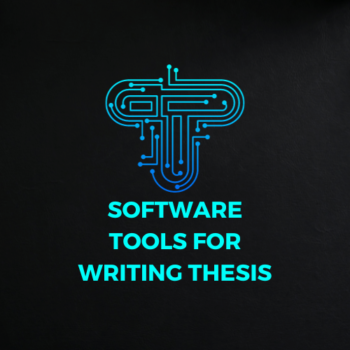
Crafting a thesis may seem challenging, but employing suitable software tools transforms it into a more structured and approachable undertaking. Delve into these potent resources to simplify your research, elevate your writing, and excel in your academic pursuits. This post elaborates on several tools commonly utilized for academic thesis writing.
Citavi is a comprehensive reference management and knowledge organization tool. It allows you to manage references, create citations, and organize your research materials. Citavi is commonly used by students and researchers.
Docear is a unique solution to academic literature management, i.e., it helps you organizing, creating, and discovering academic literature. This unique literature management tool designed specifically for academics when it comes to discovering, organizing and ultimately creating academic literature. A recommender system that helps you to discover new literature: Docear recommends papers which are free, in full-text, instantly to download, and tailored to your information needs.
3. Paperpile
Paperpile is a software for reference management that is just like Zotero and works like an extension for the Google Chrome browser, making it accessible for Linux, Mac, and Windows users. We suggest that you use it to discover and import information from stage platforms such as PubMed, arXiv, and Google Chrome. You can undoubtedly trade all the PDF archives and information to Google Drive, which implies you will have the chance to edit your papers collaboratively. This collaboration will not end, as you can send data back and forth between P Zotero and Paperpile, such as Mendeley.
4. RefWorks
RefWorks is accurate; select from thousands of customizable citation styles to use within authoring tools. Generate bibliographies and citations in a snap with any authoring tool. Use our integrations to insert citations in Word and Google Docs. Leverage thousands of pre-built citation styles and request new styles. Customize citation styles or create your own from scratch with the citation style editor.
5. SpellCheckPlus
SpellCheckPlus applies the same concept to the writing process. Rather than simply correcting your mistakes, it summarizes them into distinct categories. SpellCheckPlus offers feedback that not only improves your current project but also your writing and grammar at large. In other words, SpellCheckPlus is no mere editing tool; rather, it’s a teaching tool. And as even the very best writers know, there’s always room for improvement when it comes to how you deliver your message.
MindMup acts as an online mind-mapping canvas, perfect for representing ideas and concepts visually. Capture ideas at the speed of thought using a mind map maker designed to help you focus on your ideas and remove all the distractions while mindmapping. MindMup is also a terrific collaborative tool.
7. iA Writer
iA Writer gives you the essence of pure writing by providing an unobtrusive interface that lets you concentrate on your text. Despite its minimalistic approach, the application offers a variety of distinctive features that are specifically designed for writing-focused tasks. With iA Writer, you can gain unparalleled insight into your writing structure, detect superfluous words and clichés, and navigate through your documents and notes with ease.
Elicit uses language models to extract data from and summarize research papers. As a new technology, language models sometimes make up inaccurate answers (called hallucinations). They reduce hallucinations and increase accuracy by: training our models on specific tasks; searching over academic papers; and making it easy to double-check answers. Elicit only shows you papers that actually exist and are part of the scientific literature.
9. Lucidchart
It is an online diagramming tool to create flowcharts, diagrams, and visuals. Lucidchart is an intelligent diagramming application that brings teams together to make better decisions and build the future. Lucidchart helps users sketch and share professional flowchart diagrams, providing designs for anything from brainstorming to project management.
10. Trinka AI
Trinka is an online grammar checker and language correction AI tool for academic and technical writing. Trinka finds difficult errors unique to academic writing that other grammar checker tools don’t. From advanced English grammar errors to scientific tone and style, Trinka checks it all! Trinka goes beyond professional grammar checks and enhances your writing for vocabulary, tone, syntax, and much more. Make your point confidently with Trinka.
11. WhiteSmoke
WhiteSmoke renders you with the highest quality proofreading abilities available, correcting not only simple spelling mistakes like old-fashioned word processors but everything from grammar, word choices, and even style mistakes, all without breaking a sweat.
https://www.ref-n-write.com/blog/academic-writing-tools-and-research-software-a-comprehensive-guide/
Leave a Reply Cancel reply
Your email address will not be published. Required fields are marked *
Save my name, email, and website in this browser for the next time I comment.
How To Write A Dissertation Or Thesis
8 straightforward steps to craft an a-grade dissertation.
By: Derek Jansen (MBA) Expert Reviewed By: Dr Eunice Rautenbach | June 2020
Writing a dissertation or thesis is not a simple task. It takes time, energy and a lot of will power to get you across the finish line. It’s not easy – but it doesn’t necessarily need to be a painful process. If you understand the big-picture process of how to write a dissertation or thesis, your research journey will be a lot smoother.
In this post, I’m going to outline the big-picture process of how to write a high-quality dissertation or thesis, without losing your mind along the way. If you’re just starting your research, this post is perfect for you. Alternatively, if you’ve already submitted your proposal, this article which covers how to structure a dissertation might be more helpful.
How To Write A Dissertation: 8 Steps
- Clearly understand what a dissertation (or thesis) is
- Find a unique and valuable research topic
- Craft a convincing research proposal
- Write up a strong introduction chapter
- Review the existing literature and compile a literature review
- Design a rigorous research strategy and undertake your own research
- Present the findings of your research
- Draw a conclusion and discuss the implications

Step 1: Understand exactly what a dissertation is
This probably sounds like a no-brainer, but all too often, students come to us for help with their research and the underlying issue is that they don’t fully understand what a dissertation (or thesis) actually is.
So, what is a dissertation?
At its simplest, a dissertation or thesis is a formal piece of research , reflecting the standard research process . But what is the standard research process, you ask? The research process involves 4 key steps:
- Ask a very specific, well-articulated question (s) (your research topic)
- See what other researchers have said about it (if they’ve already answered it)
- If they haven’t answered it adequately, undertake your own data collection and analysis in a scientifically rigorous fashion
- Answer your original question(s), based on your analysis findings

In short, the research process is simply about asking and answering questions in a systematic fashion . This probably sounds pretty obvious, but people often think they’ve done “research”, when in fact what they have done is:
- Started with a vague, poorly articulated question
- Not taken the time to see what research has already been done regarding the question
- Collected data and opinions that support their gut and undertaken a flimsy analysis
- Drawn a shaky conclusion, based on that analysis
If you want to see the perfect example of this in action, look out for the next Facebook post where someone claims they’ve done “research”… All too often, people consider reading a few blog posts to constitute research. Its no surprise then that what they end up with is an opinion piece, not research. Okay, okay – I’ll climb off my soapbox now.
The key takeaway here is that a dissertation (or thesis) is a formal piece of research, reflecting the research process. It’s not an opinion piece , nor a place to push your agenda or try to convince someone of your position. Writing a good dissertation involves asking a question and taking a systematic, rigorous approach to answering it.
If you understand this and are comfortable leaving your opinions or preconceived ideas at the door, you’re already off to a good start!

Step 2: Find a unique, valuable research topic
As we saw, the first step of the research process is to ask a specific, well-articulated question. In other words, you need to find a research topic that asks a specific question or set of questions (these are called research questions ). Sounds easy enough, right? All you’ve got to do is identify a question or two and you’ve got a winning research topic. Well, not quite…
A good dissertation or thesis topic has a few important attributes. Specifically, a solid research topic should be:
Let’s take a closer look at these:
Attribute #1: Clear
Your research topic needs to be crystal clear about what you’re planning to research, what you want to know, and within what context. There shouldn’t be any ambiguity or vagueness about what you’ll research.
Here’s an example of a clearly articulated research topic:
An analysis of consumer-based factors influencing organisational trust in British low-cost online equity brokerage firms.
As you can see in the example, its crystal clear what will be analysed (factors impacting organisational trust), amongst who (consumers) and in what context (British low-cost equity brokerage firms, based online).
Need a helping hand?
Attribute #2: Unique
Your research should be asking a question(s) that hasn’t been asked before, or that hasn’t been asked in a specific context (for example, in a specific country or industry).
For example, sticking organisational trust topic above, it’s quite likely that organisational trust factors in the UK have been investigated before, but the context (online low-cost equity brokerages) could make this research unique. Therefore, the context makes this research original.
One caveat when using context as the basis for originality – you need to have a good reason to suspect that your findings in this context might be different from the existing research – otherwise, there’s no reason to warrant researching it.
Attribute #3: Important
Simply asking a unique or original question is not enough – the question needs to create value. In other words, successfully answering your research questions should provide some value to the field of research or the industry. You can’t research something just to satisfy your curiosity. It needs to make some form of contribution either to research or industry.
For example, researching the factors influencing consumer trust would create value by enabling businesses to tailor their operations and marketing to leverage factors that promote trust. In other words, it would have a clear benefit to industry.
So, how do you go about finding a unique and valuable research topic? We explain that in detail in this video post – How To Find A Research Topic . Yeah, we’ve got you covered 😊
Step 3: Write a convincing research proposal
Once you’ve pinned down a high-quality research topic, the next step is to convince your university to let you research it. No matter how awesome you think your topic is, it still needs to get the rubber stamp before you can move forward with your research. The research proposal is the tool you’ll use for this job.
So, what’s in a research proposal?
The main “job” of a research proposal is to convince your university, advisor or committee that your research topic is worthy of approval. But convince them of what? Well, this varies from university to university, but generally, they want to see that:
- You have a clearly articulated, unique and important topic (this might sound familiar…)
- You’ve done some initial reading of the existing literature relevant to your topic (i.e. a literature review)
- You have a provisional plan in terms of how you will collect data and analyse it (i.e. a methodology)
At the proposal stage, it’s (generally) not expected that you’ve extensively reviewed the existing literature , but you will need to show that you’ve done enough reading to identify a clear gap for original (unique) research. Similarly, they generally don’t expect that you have a rock-solid research methodology mapped out, but you should have an idea of whether you’ll be undertaking qualitative or quantitative analysis , and how you’ll collect your data (we’ll discuss this in more detail later).
Long story short – don’t stress about having every detail of your research meticulously thought out at the proposal stage – this will develop as you progress through your research. However, you do need to show that you’ve “done your homework” and that your research is worthy of approval .
So, how do you go about crafting a high-quality, convincing proposal? We cover that in detail in this video post – How To Write A Top-Class Research Proposal . We’ve also got a video walkthrough of two proposal examples here .
Step 4: Craft a strong introduction chapter
Once your proposal’s been approved, its time to get writing your actual dissertation or thesis! The good news is that if you put the time into crafting a high-quality proposal, you’ve already got a head start on your first three chapters – introduction, literature review and methodology – as you can use your proposal as the basis for these.
Handy sidenote – our free dissertation & thesis template is a great way to speed up your dissertation writing journey.
What’s the introduction chapter all about?
The purpose of the introduction chapter is to set the scene for your research (dare I say, to introduce it…) so that the reader understands what you’ll be researching and why it’s important. In other words, it covers the same ground as the research proposal in that it justifies your research topic.
What goes into the introduction chapter?
This can vary slightly between universities and degrees, but generally, the introduction chapter will include the following:
- A brief background to the study, explaining the overall area of research
- A problem statement , explaining what the problem is with the current state of research (in other words, where the knowledge gap exists)
- Your research questions – in other words, the specific questions your study will seek to answer (based on the knowledge gap)
- The significance of your study – in other words, why it’s important and how its findings will be useful in the world
As you can see, this all about explaining the “what” and the “why” of your research (as opposed to the “how”). So, your introduction chapter is basically the salesman of your study, “selling” your research to the first-time reader and (hopefully) getting them interested to read more.
How do I write the introduction chapter, you ask? We cover that in detail in this post .

Step 5: Undertake an in-depth literature review
As I mentioned earlier, you’ll need to do some initial review of the literature in Steps 2 and 3 to find your research gap and craft a convincing research proposal – but that’s just scratching the surface. Once you reach the literature review stage of your dissertation or thesis, you need to dig a lot deeper into the existing research and write up a comprehensive literature review chapter.
What’s the literature review all about?
There are two main stages in the literature review process:
Literature Review Step 1: Reading up
The first stage is for you to deep dive into the existing literature (journal articles, textbook chapters, industry reports, etc) to gain an in-depth understanding of the current state of research regarding your topic. While you don’t need to read every single article, you do need to ensure that you cover all literature that is related to your core research questions, and create a comprehensive catalogue of that literature , which you’ll use in the next step.
Reading and digesting all the relevant literature is a time consuming and intellectually demanding process. Many students underestimate just how much work goes into this step, so make sure that you allocate a good amount of time for this when planning out your research. Thankfully, there are ways to fast track the process – be sure to check out this article covering how to read journal articles quickly .

Literature Review Step 2: Writing up
Once you’ve worked through the literature and digested it all, you’ll need to write up your literature review chapter. Many students make the mistake of thinking that the literature review chapter is simply a summary of what other researchers have said. While this is partly true, a literature review is much more than just a summary. To pull off a good literature review chapter, you’ll need to achieve at least 3 things:
- You need to synthesise the existing research , not just summarise it. In other words, you need to show how different pieces of theory fit together, what’s agreed on by researchers, what’s not.
- You need to highlight a research gap that your research is going to fill. In other words, you’ve got to outline the problem so that your research topic can provide a solution.
- You need to use the existing research to inform your methodology and approach to your own research design. For example, you might use questions or Likert scales from previous studies in your your own survey design .
As you can see, a good literature review is more than just a summary of the published research. It’s the foundation on which your own research is built, so it deserves a lot of love and attention. Take the time to craft a comprehensive literature review with a suitable structure .
But, how do I actually write the literature review chapter, you ask? We cover that in detail in this video post .
Step 6: Carry out your own research
Once you’ve completed your literature review and have a sound understanding of the existing research, its time to develop your own research (finally!). You’ll design this research specifically so that you can find the answers to your unique research question.
There are two steps here – designing your research strategy and executing on it:
1 – Design your research strategy
The first step is to design your research strategy and craft a methodology chapter . I won’t get into the technicalities of the methodology chapter here, but in simple terms, this chapter is about explaining the “how” of your research. If you recall, the introduction and literature review chapters discussed the “what” and the “why”, so it makes sense that the next point to cover is the “how” –that’s what the methodology chapter is all about.
In this section, you’ll need to make firm decisions about your research design. This includes things like:
- Your research philosophy (e.g. positivism or interpretivism )
- Your overall methodology (e.g. qualitative , quantitative or mixed methods)
- Your data collection strategy (e.g. interviews , focus groups, surveys)
- Your data analysis strategy (e.g. content analysis , correlation analysis, regression)
If these words have got your head spinning, don’t worry! We’ll explain these in plain language in other posts. It’s not essential that you understand the intricacies of research design (yet!). The key takeaway here is that you’ll need to make decisions about how you’ll design your own research, and you’ll need to describe (and justify) your decisions in your methodology chapter.
2 – Execute: Collect and analyse your data
Once you’ve worked out your research design, you’ll put it into action and start collecting your data. This might mean undertaking interviews, hosting an online survey or any other data collection method. Data collection can take quite a bit of time (especially if you host in-person interviews), so be sure to factor sufficient time into your project plan for this. Oftentimes, things don’t go 100% to plan (for example, you don’t get as many survey responses as you hoped for), so bake a little extra time into your budget here.
Once you’ve collected your data, you’ll need to do some data preparation before you can sink your teeth into the analysis. For example:
- If you carry out interviews or focus groups, you’ll need to transcribe your audio data to text (i.e. a Word document).
- If you collect quantitative survey data, you’ll need to clean up your data and get it into the right format for whichever analysis software you use (for example, SPSS, R or STATA).
Once you’ve completed your data prep, you’ll undertake your analysis, using the techniques that you described in your methodology. Depending on what you find in your analysis, you might also do some additional forms of analysis that you hadn’t planned for. For example, you might see something in the data that raises new questions or that requires clarification with further analysis.
The type(s) of analysis that you’ll use depend entirely on the nature of your research and your research questions. For example:
- If your research if exploratory in nature, you’ll often use qualitative analysis techniques .
- If your research is confirmatory in nature, you’ll often use quantitative analysis techniques
- If your research involves a mix of both, you might use a mixed methods approach
Again, if these words have got your head spinning, don’t worry! We’ll explain these concepts and techniques in other posts. The key takeaway is simply that there’s no “one size fits all” for research design and methodology – it all depends on your topic, your research questions and your data. So, don’t be surprised if your study colleagues take a completely different approach to yours.

Step 7: Present your findings
Once you’ve completed your analysis, it’s time to present your findings (finally!). In a dissertation or thesis, you’ll typically present your findings in two chapters – the results chapter and the discussion chapter .
What’s the difference between the results chapter and the discussion chapter?
While these two chapters are similar, the results chapter generally just presents the processed data neatly and clearly without interpretation, while the discussion chapter explains the story the data are telling – in other words, it provides your interpretation of the results.
For example, if you were researching the factors that influence consumer trust, you might have used a quantitative approach to identify the relationship between potential factors (e.g. perceived integrity and competence of the organisation) and consumer trust. In this case:
- Your results chapter would just present the results of the statistical tests. For example, correlation results or differences between groups. In other words, the processed numbers.
- Your discussion chapter would explain what the numbers mean in relation to your research question(s). For example, Factor 1 has a weak relationship with consumer trust, while Factor 2 has a strong relationship.
Depending on the university and degree, these two chapters (results and discussion) are sometimes merged into one , so be sure to check with your institution what their preference is. Regardless of the chapter structure, this section is about presenting the findings of your research in a clear, easy to understand fashion.
Importantly, your discussion here needs to link back to your research questions (which you outlined in the introduction or literature review chapter). In other words, it needs to answer the key questions you asked (or at least attempt to answer them).
For example, if we look at the sample research topic:
In this case, the discussion section would clearly outline which factors seem to have a noteworthy influence on organisational trust. By doing so, they are answering the overarching question and fulfilling the purpose of the research .

For more information about the results chapter , check out this post for qualitative studies and this post for quantitative studies .
Step 8: The Final Step Draw a conclusion and discuss the implications
Last but not least, you’ll need to wrap up your research with the conclusion chapter . In this chapter, you’ll bring your research full circle by highlighting the key findings of your study and explaining what the implications of these findings are.
What exactly are key findings? The key findings are those findings which directly relate to your original research questions and overall research objectives (which you discussed in your introduction chapter). The implications, on the other hand, explain what your findings mean for industry, or for research in your area.
Sticking with the consumer trust topic example, the conclusion might look something like this:
Key findings
This study set out to identify which factors influence consumer-based trust in British low-cost online equity brokerage firms. The results suggest that the following factors have a large impact on consumer trust:
While the following factors have a very limited impact on consumer trust:
Notably, within the 25-30 age groups, Factors E had a noticeably larger impact, which may be explained by…
Implications
The findings having noteworthy implications for British low-cost online equity brokers. Specifically:
The large impact of Factors X and Y implies that brokers need to consider….
The limited impact of Factor E implies that brokers need to…
As you can see, the conclusion chapter is basically explaining the “what” (what your study found) and the “so what?” (what the findings mean for the industry or research). This brings the study full circle and closes off the document.

Let’s recap – how to write a dissertation or thesis
You’re still with me? Impressive! I know that this post was a long one, but hopefully you’ve learnt a thing or two about how to write a dissertation or thesis, and are now better equipped to start your own research.
To recap, the 8 steps to writing a quality dissertation (or thesis) are as follows:
- Understand what a dissertation (or thesis) is – a research project that follows the research process.
- Find a unique (original) and important research topic
- Craft a convincing dissertation or thesis research proposal
- Write a clear, compelling introduction chapter
- Undertake a thorough review of the existing research and write up a literature review
- Undertake your own research
- Present and interpret your findings
Once you’ve wrapped up the core chapters, all that’s typically left is the abstract , reference list and appendices. As always, be sure to check with your university if they have any additional requirements in terms of structure or content.

Psst... there’s more!
This post was based on one of our popular Research Bootcamps . If you're working on a research project, you'll definitely want to check this out ...
You Might Also Like:

20 Comments
thankfull >>>this is very useful
Thank you, it was really helpful
unquestionably, this amazing simplified way of teaching. Really , I couldn’t find in the literature words that fully explicit my great thanks to you. However, I could only say thanks a-lot.
Great to hear that – thanks for the feedback. Good luck writing your dissertation/thesis.
This is the most comprehensive explanation of how to write a dissertation. Many thanks for sharing it free of charge.
Very rich presentation. Thank you
Thanks Derek Jansen|GRADCOACH, I find it very useful guide to arrange my activities and proceed to research!
Thank you so much for such a marvelous teaching .I am so convinced that am going to write a comprehensive and a distinct masters dissertation
It is an amazing comprehensive explanation
This was straightforward. Thank you!
I can say that your explanations are simple and enlightening – understanding what you have done here is easy for me. Could you write more about the different types of research methods specific to the three methodologies: quan, qual and MM. I look forward to interacting with this website more in the future.
Thanks for the feedback and suggestions 🙂
Hello, your write ups is quite educative. However, l have challenges in going about my research questions which is below; *Building the enablers of organisational growth through effective governance and purposeful leadership.*
Very educating.
Just listening to the name of the dissertation makes the student nervous. As writing a top-quality dissertation is a difficult task as it is a lengthy topic, requires a lot of research and understanding and is usually around 10,000 to 15000 words. Sometimes due to studies, unbalanced workload or lack of research and writing skill students look for dissertation submission from professional writers.
Thank you 💕😊 very much. I was confused but your comprehensive explanation has cleared my doubts of ever presenting a good thesis. Thank you.
thank you so much, that was so useful
Hi. Where is the excel spread sheet ark?
could you please help me look at your thesis paper to enable me to do the portion that has to do with the specification
my topic is “the impact of domestic revenue mobilization.
Submit a Comment Cancel reply
Your email address will not be published. Required fields are marked *
Save my name, email, and website in this browser for the next time I comment.
- Print Friendly

AI For Dissertation: Best AI Tools For Masters & PhD Thesis Writing
Writing a dissertation can be a daunting task for master’s and PhD students, but AI tools are transforming this challenging process.
From generating detailed mind maps to providing accurate citations and real-time research insights, AI-powered writing assistants streamline every aspect of thesis writing.
In this article, we explore the best AI tools available, highlighting how they can:
- enhance your academic writing,
- simplify complex tasks, and
- help produce high-quality, well-structured content.
Best AI Tools For Masters & PhD Thesis Writing
| Heuristi.ca | – Generates detailed mind maps – Organises literature reviews – Ensures coherence |
| Open Read | – AI-generated summaries – Detailed insights – Real-time Q&A |
| Explain Paper | – Simplifies complex concepts – Tailored explanations – Aids in literature reviews |
| Paper Brain | – Provides concise summaries – Highlights key points – Aids in literature reviews |
| Einblick | – Generates tailored visual aids – Simplifies data presentation – Useful for literature reviews |
| Tavily | – Gathers accurate data – Provides detailed summaries – Streamlines literature review processes |
| Power Drill | – Analyses data sources – Provides insightful summaries – Ensures coherence |
| SciSpace | – Detailed summaries & key insights – Concise “too long; didn’t read” summaries – Accurate citation checks |
| Next Net | – Real-time searches of literature and data – Organised summaries – Ideal for health research |
| ChatGPT | – Generates detailed responses – Drafts sections – Makes writing tasks more manageable |
| Perplexity | – Provides accurate references – Real-time sourced answers – Streamlines literature reviews |
| Bing | – Offers versatile response types (creative, balanced, precise) – Aids in writing comprehensive dissertations or theses |
Heuristi.ca – Mind Map Maker
Heuristi.ca is an AI-powered writing tool designed to streamline your dissertation writing process.
This AI tool helps you write your thesis or research paper by creating detailed mind maps tailored to academic writing.
You input a topic, like “organic photovoltaics,” and the AI generates related concepts and real-time insights. This assists in organising your literature review and structuring your academic writing.
The AI assistant ensures coherence by connecting related ideas, making writing more manageable and efficient. It helps avoid plagiarism by providing original content and AI-driven citation suggestions.
By automating and streamlining aspects of the writing process, Heuristi.ca helps you meet deadlines and maintain academic standards.
Open Read – Generate Summaries
Open Read is an AI-powered writing tool designed to enhance your thesis writing process. With Open Read, you can upload research papers and receive AI-generated summaries, making literature reviews more manageable.

The tool offers real-time features like paper Q&A and AI summaries, which streamline your academic writing tasks.
For example, you can upload a PDF and get a concise summary, along with detailed insights into the paper’s background and significance.
This AI tool helps you write your dissertation by breaking down complex information into bite-sized chunks, saving you time and effort.
Open Read also helps ensure academic integrity by providing accurate citations and checking for plagiarism.
Explain Paper
Explain Paper is an AI tool that simplifies the academic writing process.E xplain Paper supports dissertation writing by making research more digestible and manageable.
To use Explain Paper, simply:
- upload a research paper,
- select the text you want to understand, and
- choose an explanation level.
The AI provides clear explanations tailored to different educational levels, making complex research accessible.
You can select a dense paragraph and have it explained as if to a middle schooler or a college student. This helps in breaking down intricate concepts, streamlining your literature review.
The tool also ensures your writing adheres to academic standards by providing coherent summaries and related resources.
Paper Brain
Paper Brain is an AI tool designed to streamline your academic writing process. You upload a research paper, and the AI analyzes and generates concise summaries, making it easier to grasp complex topics.
This AI-powered assistant helps you write your dissertation by providing clear and concise explanations, ensuring coherence and adherence to academic standards.

You can upload a paper on graphene thickness measurement, and Paper Brain will summarise its key points and answer specific questions about the research.
This tool is invaluable for literature reviews, as it simplifies the extraction of relevant information. Graduate students writing a thesis can benefit from Paper Brain’s AI technology, which makes writing tasks more manageable and efficient.
Einblick is an AI-powered writing tool that simplifies data visualisation for your dissertation or thesis.
Einblick can analyze and present data coherently, helping you write your dissertation with accurate, well-organized charts and graphs.
This tool is simple to use – you upload your dataset, describe the chart you need, and Einblick generates it.
This tool helps you visualise complex data quickly and efficiently, which is crucial for academic writing and literature reviews.
Let’s say if you need a scatterplot of N2O versus CH4 emissions. Einblick creates it in seconds. This AI assistant streamlines the thesis writing process by providing clear, tailored visual aids, ensuring your research paper meets academic standards.
Tavily is an AI-powered research assistant designed to streamline your dissertation writing process. You simply input your research topic, and Tavily creates an AI agent that scours the internet for relevant information.
This AI tool ensures that the data you receive is accurate and up-to-date, helping you write your dissertation or thesis with confidence.
If you’re researching organic photovoltaic devices, Tavily will provide:
- detailed summaries,
- key findings, and
- relevant sources.
This AI writing assistant makes the literature review process more manageable by automating and streamlining the search for academic papers.
It also offers tailored content that adheres to academic standards, ensuring coherence and quality in your writing.
Graduate students find Tavily invaluable for meeting deadlines and enhancing academic writing skills. The tool’s ability to analyse and synthesise vast amounts of data in real-time allows you to focus on the writing process.
Using AI technology, Tavily helps you achieve academic success by providing a solid foundation for your thesis or dissertation.
Power Drill
Power Drill is an AI-powered writing tool designed to assist you in the dissertation writing process. To use Power Drill, you start by uploading your data sets, which can be:
- web pages, or
- files.
The AI then analyses these data sources, providing insightful summaries and answers to specific questions.
This helps streamline the research and writing process, making it easier to organize your thoughts and structure your thesis.
You can upload a research paper, and Power Drill will highlight key points and generate concise summaries. This AI tool helps you write your dissertation by breaking down complex information into manageable parts, saving you time and effort.

Graduate students find Power Drill particularly helpful for meeting deadlines and adhering to academic standards.
The tool ensures coherence in your writing by offering accurate citations and reducing the risk of plagiarism.
Power Drill can also scan vast databases and provide real-time insights, helping you achieve academic success and write a compelling thesis or dissertation.
SciSpace is an AI-powered writing tool designed to simplify the academic writing process for dissertations and theses.
You upload your research papers, and SciSpace provides detailed summaries and key insights, making literature reviews more manageable. This AI tool uses natural language processing to extract essential information, helping you organise and streamline your writing tasks.
When you upload a PDF, SciSpace offers a concise “too long; didn’t read” summary, highlighting conclusions and significant points.
This is especially useful for graduate students who need to write their dissertation or thesis efficiently.
SciSpace also includes an AI writing assistant, which helps ensure coherence and adherence to academic standards by generating accurate citations and checking for plagiarism.
Using AI technology, SciSpace can analyze vast databases and provide real-time insights, making your writing process more manageable.
This tool helps you meet deadlines and achieve academic success by automating and streamlining various aspects of academic writing, ultimately supporting you in creating well-structured and high-quality written content.
Next Net – For Drug & Health Research
Next Net is an AI-powered tool tailored for those in the drug and health research fields. This AI assistant helps you write your dissertation or thesis by providing comprehensive, real-time searches of the latest literature and research data.

You input your query, and Next Net uses advanced AI technology to scan vast databases for relevant information.
For example, if you’re researching new drugs, Next Net offers detailed insights into recent developments, gene expressions, and clinical trials.
This AI tool streamlines the literature review process by organizing complex data into manageable, easy-to-understand summaries.
Graduate students find Next Net invaluable for its ability to generate accurate citations and ensure academic integrity.
Next Net’s AI-driven approach makes writing a thesis more efficient, allowing you to focus on creating well-structured, high-quality content. This AI tool is essential for achieving academic success in the health research domain.
Chat GPT, Perplexity, Bing
ChatGPT , Perplexity, and Bing are AI-powered writing tools that significantly enhance the academic writing process. Each tool leverages artificial intelligence to assist with various aspects of dissertation and thesis writing.
ChatGPT uses advanced natural language processing to generate coherent, detailed responses to research queries. You can ask it to help:
- outline your thesis,
- draft sections of your dissertation, or
- provide insights on complex topics.
It’s particularly useful for brainstorming and refining ideas, making writing tasks more manageable. You can also create templates to help you generate texts faster.
Perplexity , another AI tool, excels at providing real-time, accurate references for your research paper. By asking Perplexity detailed questions, you get precise, sourced answers that streamline your literature review.
Bing, integrated with AI, offers a balanced approach to research. You can specify the type of response you need—creative, balanced, or precise—making it a versatile assistant for academic writing.
Bing’s AI can scan vast databases to find relevant information, helping you write your dissertation or thesis with comprehensive, up-to-date data.
By automating and streamlining the writing process, ChatGPT, Perplexity, and Bing help you achieve academic success with well-researched and well-written content.
AI Tools For Thesis and Dissertation Writing
From Heuristi.ca’s mind mapping to ChatGPT’s brainstorming capabilities, these AI-powered assistants streamline literature reviews, ensure academic standards, and provide accurate citations.
Tools like Open Read and Explain Paper simplify complex concepts, while Einblick and Next Net offer data visualization and real-time research insights.
By leveraging these AI tools, graduate students can enhance their academic writing skills, meet deadlines, and achieve academic success efficiently.

Dr Andrew Stapleton has a Masters and PhD in Chemistry from the UK and Australia. He has many years of research experience and has worked as a Postdoctoral Fellow and Associate at a number of Universities. Although having secured funding for his own research, he left academia to help others with his YouTube channel all about the inner workings of academia and how to make it work for you.
Thank you for visiting Academia Insider.
We are here to help you navigate Academia as painlessly as possible. We are supported by our readers and by visiting you are helping us earn a small amount through ads and affiliate revenue - Thank you!

2024 © Academia Insider

Thesis Editing Services
Professional thesis proofreading & editing services.
Expert thesis editors polish your writing to reflect the work you put into it. Professional thesis editing will:
- Turn your thesis into a flawless piece of writing
- Lift the quality of your thesis as a whole
- Make you submit your thesis with confidence

- Proofreading & Editing
- Thesis Editing Service
Industry-specific editors
Become a better writer, 100% happiness guarantee.
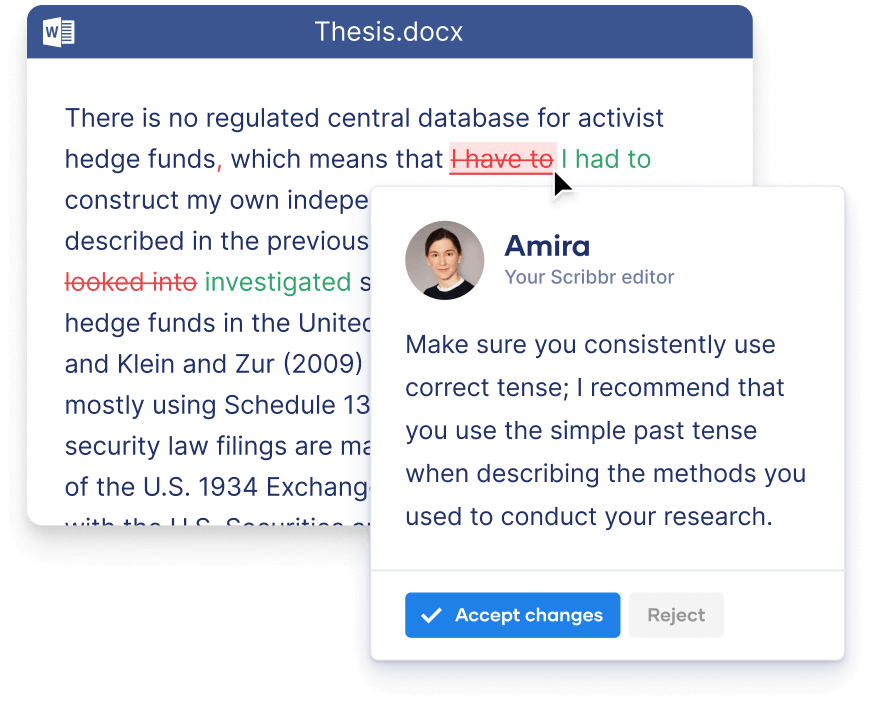
Thesis editing services
Get your thesis back, free of language errors and inconsistencies.
Standard thesis Proofreading & Editing is perfect if you’re confident about your writing but need a second pair of eyes to catch:
- Spelling and grammar errors
- Inconsistencies in dialect
- Overuse of passive voice
- Subjective or inflated language
For a more comprehensive edit, you can add one or multiple add-on editing services that fit your needs.
| ⏰ Deadline | Same day delivery |
|---|---|
| 📄 Texts | Thesis |
| ⭐️ Rating | based on 13,185 reviews |

Add-on services
Customize your editing package to get the help you need, structure check, clarity check, paper formatting, citation editing.
Ensures sections and chapters are structured and focused and your writing is free of redundancies.
- Through in-text feedback, your editor will help:
- Organize and focus individual chapters and sections
- Eliminate repetitive and redundant information
- Perfect transitions between sentences and paragraphs
- Align titles and headings with the section’s content
You’ll also receive a personalized Structure Check Report meant to help you identify missing elements in each chapter or section and prioritize improvements.
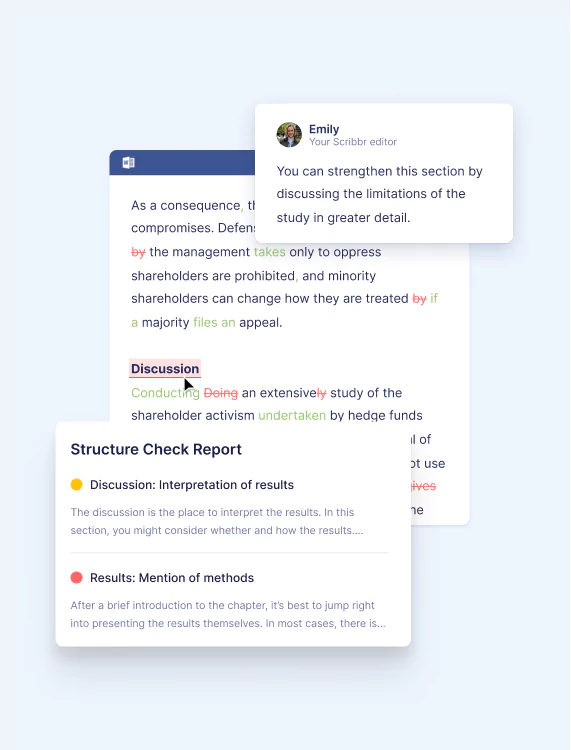
Ensures ideas are presented clearly, your arguments are consistent, and your audience can follow along.
Through in-text comments and checklists, your editor will:
- Make sure your text tells a clear and logical story
- Check that you’ve clearly presented concepts, ideas, and key terms
- Make sure your key takeaways and conclusions are front and center
- Highlight contradictions within the text
- Ensure you’re keeping your audience’s needs in mind
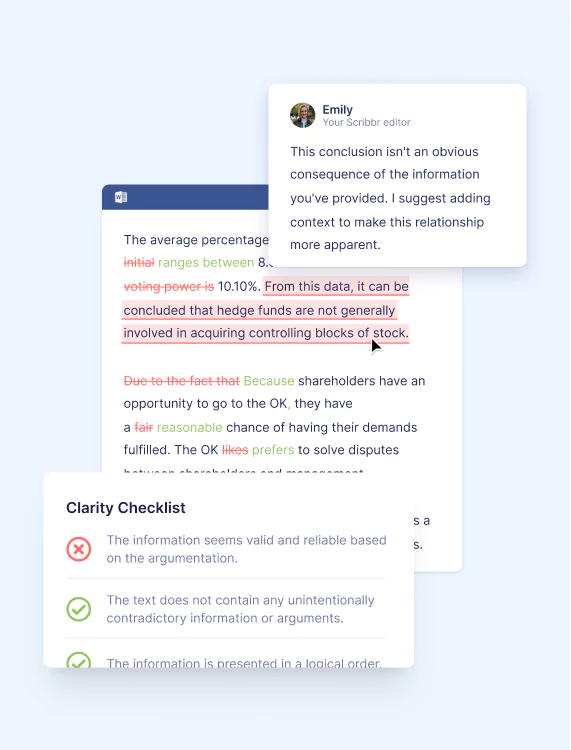
Ensures a professional look for your document that meets your formatting requirements.
Your formatting expert will ensure consistency for the following:
- Margins, spacing, and indentation
- Body text and headings
- Page numbers
- Abstract and keywords
- Explanatory footnotes
Choose our Paper Formatting service for a professional finish or our APA Editing Service for the most up-to-date APA formatting.
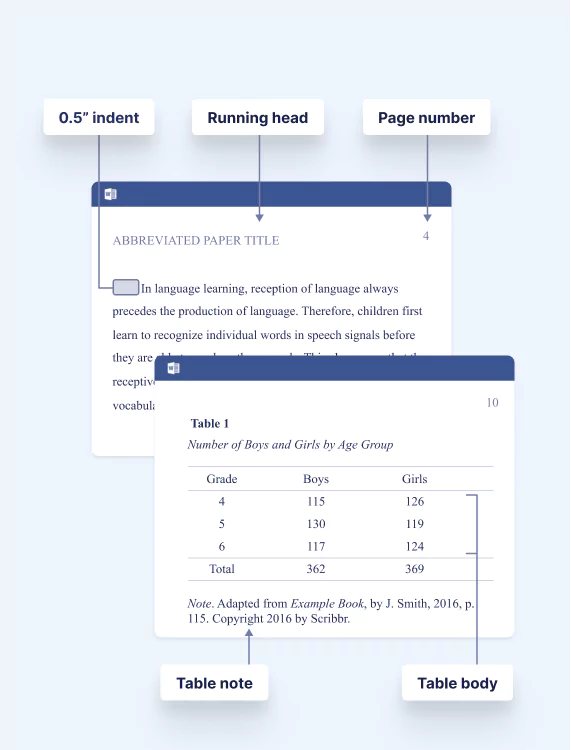
Citation Editing ensures your citations and references are consistent and meet your style guide’s requirements.
After you provide your document with a reference list, your citation expert will:
- Format the layout of your reference page (margins, indents, spacing)
- Ensure that your chosen citation style is applied consistently according to the guidelines
- Cross-check citations with reference entries
- Provide feedback on reference list entries that you need to complete due to missing information
Your expert is familiar with all common citation styles. Find more information about the service and our requirements in our FAQs .
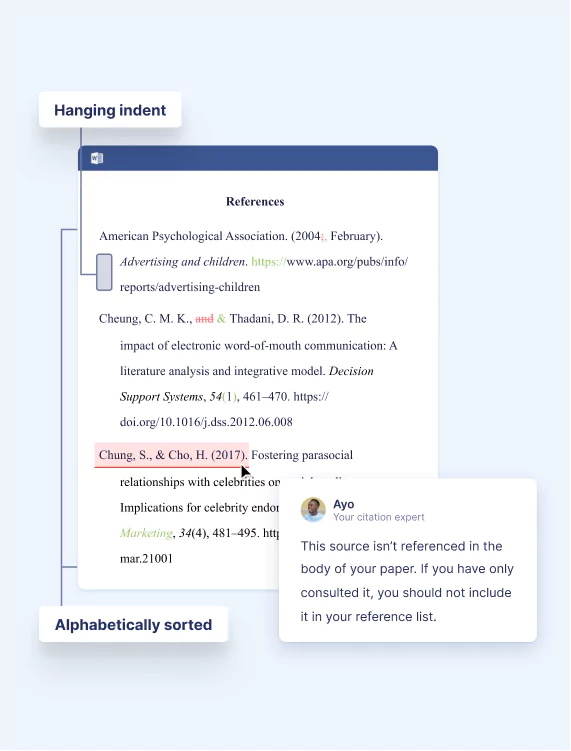
You'll get matched with the perfect editor for you
At Scribbr, you can rest assured that only the best editors will work on your paper.
All our 800+ editors have passed the challenging Scribbr Academy, which has a passing rate of only 2%. To put this in perspective, Harvard has an acceptance rate of 3%
We handpick your editor on several criteria, including field of study and document type. And we’ll even expand your team with citation and formatting experts if needed.

I have a doctorate in biology and studied a range of life science subjects. I specialize in editing academic texts.

I researched at Harvard, taught English with a Fulbright in Peru, and earned a master's from Johns Hopkins.

I am an academic editor and book reviewer. I am familiar with many style guides and have edited over 6 million words.

I have a bachelor's in electrical engineering and a master's in psychology and am pursuing a PhD in neuroscience.

I am an ESL teacher and academic editor with a research background in the humanities, arts, and culture.
Maximize your thesis's potential with expert editing
Same day delivery
This deadline works automatically for the following document sizes:
- 3 hours: less than 3,000 words
- 6 hours: less than 6,000 words
- 12 hours: less than 12,000 words
Select your currency
“They proved themselves again!”
They proved themselves again as an excellent service. They have talented editors which can improve your thesis or other document greatly, especially if you struggle with your writing. Furthermore, their customer service communication is likewise excellent, as they will repeatedly check if everything is according to your wishes, will answer fast, and at any time.
How it works
Get your thesis edited in 3 easy steps, upload any time.
Upload your document and easily select the pages that need editing. Next, choose your turnaround time and services and explain your situation and needs to the editor.
Stay in the loop
After placing your order you can keep track of our progress. From finding your perfect editor to potential hand-overs to formatting or citation experts.
Revise and submit
You’ll receive back your document with tracked changes and feedback as well as a personal letter from your editor. The last step is submitting your work with confidence!
Scribbr & academic integrity
Scribbr is committed to protecting academic integrity. Our proofreading service, our AI writing tools ( plagiarism checker , paraphrasing tool , grammar checker , summarizer, Citation Generator ) as well as our free Knowledge Base content is designed to help students produce quality academic papers.
We make every effort to prevent our software from being used for fraudulent or manipulative purposes.
Your questions, answered.
At Scribbr, we promise to make every customer 100% happy with the service we offer. Our philosophy: Your complaint is always justified – no denial, no doubts.
Our customer support team is here to find the solution that helps you the most, whether that’s a free new edit or a refund for the service.
The fastest turnaround time is 12 hours.
You can upload your document at any time and choose between four deadlines:
Yes, if your document is longer than 20,000 words, you will get a sample of approximately 2,000 words. This sample edit gives you a first impression of the editor’s editing style and a chance to ask questions and give feedback.
How does the sample edit work?
You will receive the sample edit within 12 hours after placing your order. You then have 24 hours to let us know if you’re happy with the sample or if there’s something you would like the editor to do differently.
Read more about how the sample edit works
Yes, regardless of the deadline you choose, our editors can proofread your document during weekends and holidays.
Example: If you select the 12-hour service on Saturday, you will receive your edited document back within 12 hours on Sunday.
Yes, in the order process you can indicate your preference for American, British, or Australian English .
If you don’t choose one, your editor will follow the style of English you currently use. If your editor has any questions about this, we will contact you.
Get in touch, with real people
We answer your questions quickly and personally from 9:00 to 23:00 CET

- Start live chat
- Email [email protected]
- Call +1 (510) 822-8066
- WhatsApp +31 20 261 6040
Knowledge Base
Finishing your thesis with scribbr’s top-rated guides.
Thesis Writing
How to Write a Thesis Statement
Ultimate thesis guide, how to write a thesis conclusion, thesis outline.
- Interesting
- Scholarships
- UGC-CARE Journals
Top 7 Free Online Tools for PhD Thesis Writing
Top Free Online Tools for PhD Thesis Writing
Writing a Ph.D. thesis? Don’t know how to write a Ph.D. thesis? Do not fret! Here are 7 free online tools to help you with your PhD thesis writing. If you are a research scholar currently dealing with a tough Ph.D. thesis, then you have come to the right place. In this article, iLovePhD has compiled a list of the top 7 free online tools to streamline your PhD thesis work.
- Some scholars may find it difficult to decide which tool to use, especially considering the abundance of available online alternatives and their capability to perform various tasks.
- Each online tool has its own advantages and limitations.
- Some tools are completely free, while others are free trials of software that cost money.
- Some only carry out the bare minimum of tasks, while others possess highly unique skills that enable them to do much more with the data.
Free Online Tools for PhD Thesis
1. grammarly.
- Grammarly is a free online grammar and text editing tool that can greatly help users enhance and improve their writing.
- Along with assisting you with maintaining your word count, Grammarly can help you improve your writing abilities and grammar.
- The “My Grammarly” section on the homepage of the tool allows the user to create or upload a document.
- Grammarly offers numerous alternatives for you to modify your text while also helping you save time and effort.
2. Word-Counter.io
- When it comes to actual text editing and counting, the word count is the go-to free online tool.
- Using an online word counter tool is a straightforward solution for students and teachers.
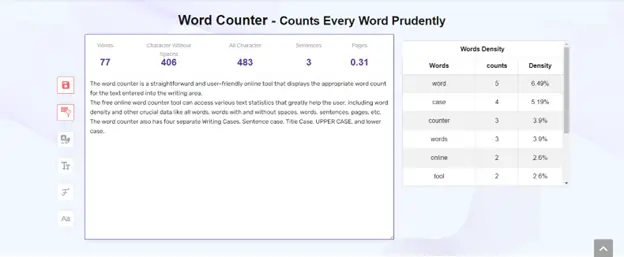
- The word counter is a straightforward and user-friendly online tool that displays the appropriate word count for the text entered into the writing area.
- The free online word counter tool can access various text statistics that greatly help the user, including word density and other crucial data like all words, words with and without spaces, words, sentences, pages, etc.
- It assists in avoiding repetition in one word and ensures that your words are consistent with one another.
- The number of rewrites and cuts may also be decreased, thus saving time and effort.
3. Quillbot’s Citation Generator
- Quillbot’s Citation Generator is a fast, reliable way to make citations for your essays, presentations, and other projects.
- We can create APA, MLA, and Chicago-style full and in-text citations in a snap.
- Quillbot is one of the top writing tools on the internet that serves the best of multiple integrated tools to the user.
- Any user can easily use the free citation generator of Quill Bot to automatically and even manually create citations within just a few seconds, with hundreds of different citation styles to choose from.
Website link: Quillbot’s Citation Generator
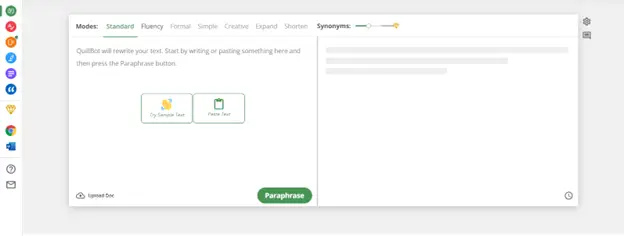
- Mindmup is a limited free online mind map creator tool designed by Sauf Pompiers Ltd that enables to the creation of graphic, digital mind maps.
- We can create, collaborate, and share mind maps in the cloud based on an open source mind map editor, with a simple and open data format.”
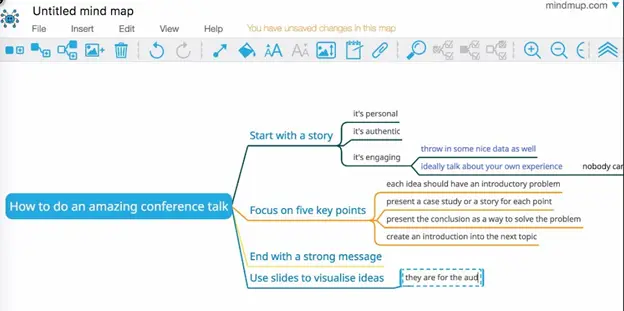
5. Text Readability Calculator Tool
- This free online tool can easily assess your text’s comprehensibility and readability, which are the most important factors to consider while writing any type of content.
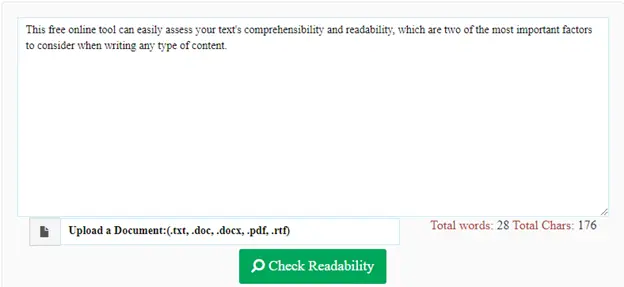
6. Plagiarism Checker free online Tool for PhD Thesis
- A plagiarism checker tool is an online tool that helps any user performs a deep web search to see if the written content matches any other similar content on the web.
- With a plagiarism checker at your disposal, you can now confirm the accuracy of the data you are about to publish.
- Any content that is to be published, it must be cross-checked with the plagiarism checker to see if it is the original content.
7. Similarly Checker
- Finally, the similarity checker can help you determine whether the current piece of writing is a repeat of earlier work.
- The Similarity Checker can compare two different types of content side by side to see if they match in any way.
- It is done so you can always create fresh content and avoid repeatedly writing the same type of text.
- The similarity checker examines every section of the provided document and identifies and highlights any content that matches in seconds.
- Using this tool, you can quickly check for repetition by comparing current assignments with similar ones and other relevant work.
As it is said before, getting a Ph.D. degree is not an easy one. So, to make it convenient and easy for scholars, iLovePhD has compiled a list of 7 free online tools that can greatly reduce the stress of writing a Ph.D. thesis.
Using the right tools can improve your productivity, enhance your content, and overcome any challenges you may face.
- apps for thesis writing
- Online Tools
- plagiarism checker
- plagiarism online
- Research Tools
40 Part-Time Jobs Websites for PhD Scholars to Earn Extra Income!
Advantages and disadvantages of getting a patent, working sci-hub proxy links – 2024, leave a reply cancel reply, most popular, icmr call for research proposal 2024, call for applications: dst inspire faculty fellowship (2024), should you quit your phd explore reasons & alternatives, india – sri lanka joint research funding opportunity, how to check scopus indexed journals 2024, apply for the dst-jsps indo-japan call 2024, india-eu partner up for explainable and robust ai research, best for you, 24 best online plagiarism checker free – 2024, what is phd, popular posts, scopus indexed journals list 2024, how to write a research paper in a month, popular category.
- POSTDOC 317
- Interesting 258
- Journals 234
- Fellowship 131
- Research Methodology 102
- All Scopus Indexed Journals 92
Mail Subscription

iLovePhD is a research education website to know updated research-related information. It helps researchers to find top journals for publishing research articles and get an easy manual for research tools. The main aim of this website is to help Ph.D. scholars who are working in various domains to get more valuable ideas to carry out their research. Learn the current groundbreaking research activities around the world, love the process of getting a Ph.D.
Contact us: [email protected]
Google News
Copyright © 2024 iLovePhD. All rights reserved
- Artificial intelligence

Experience a new era for PhD thesis writing and English editing
Sharpen your academic writing skills and deliver high-quality PhD thesis, dissertation, or essay writing for students

Paperpal It

Want smart tips and practical strategies to help you write and edit better, faster?


How to structure your PhD thesis
Organising your PhD thesis in a logical order is one of the crucial stages of your writing process. Here is a list of the individual components to include
Shama Prasada Kabekkodu

Created in partnership with

You may also like

Popular resources
.css-1txxx8u{overflow:hidden;max-height:81px;text-indent:0px;} The secrets to success as a provost
Using non verbal cues to build rapport with students, emotionally challenging research and researcher well-being, augmenting the doctoral thesis in preparation for a viva, how hard can it be testing ai detection tools.
The task of writing a PhD thesis is top of mind for many aspiring scholars. After all, completing one is no small task. And while these pieces of writing often share a standard format, this can differ slightly based on the requirements of your institution or subject. So what elements make up a PhD thesis?
A doctoral thesis usually contains:
- A title page
- Declarations from the candidate and supervisor
- A certificate from the candidate and supervisor
- A plagiarism report
- Acknowledgements
- A table of contents
- Abbreviations
- An abstract
Chapters typically cover:
- A general introduction
- Literature review
- Analysis of the gap in research with aims and objectives
- Materials and methods
- Summary and conclusion
- References or bibliography.
You should also include a list of papers you have published and any relevant achievements at the end.
An explanation of each of the components of a PhD dissertation
Title page: a PhD thesis starts with a title page that contains the complete title of the research work, the submitting university, names of the candidate and supervisor, affiliation and month and year of submission.
Abstract: this serves as a concise synopsis of the dissertation, covering the research context, purpose of the study or research questions, methodology, findings and conclusions. This section is usually one to two pages in length.
Table of contents: this page lists the thesis content and respective page numbers.
General introduction and literature review: this component is usually 20 to 40 pages long. It presents the readers with the primary material and discusses relevant published data. It provides an overview of pertinent literature related to the thesis such as texts that critically assess the existing literature to identify the gap in research and explain the need behind the study.
Aims and objectives: this section of the thesis is typically one to two pages long and describes the aims and objectives of the study. Structure them as three to four bullet points describing specific points that you will investigate. Approach this by thinking about what readers should understand by the end of the thesis. Ensure you:
- Give a clear explanation of the purpose and goals of your study
- Outline each aim concisely
- Explain how you will measure your objectives
- Ensure there is a clear connection between each aim
- Use verbs such as investigate, evaluate, explore, analyse and demonstrate.
Materials and methods: this section briefly explains how you have conducted the study and should include all the materials you used and procedures you implemented. For example, if your research involves working with chemicals, list the chemicals and instruments used, along with their catalogue numbers and manufacturers’ names. This section should also explicitly explain the methodology you used, step-by-step. Use the past tense while writing this section and do not describe any results or findings of the study yet.
Results: this section is sometimes called the “findings report” or “the experimental findings” (referring to data collection and analysis). Write the results concisely and in the past tense. Include text, figure and table infographics created with tools such as Microsoft PowerPoint, Adobe Illustrator and BioRender to visualise your data .
Discussion: this is a chance to discuss the results and compare the findings of your study with the initial hypothesis and existing knowledge. Focus on discussing interpretations, implications, limitations and recommendations here.
- Resources on academic writing for higher education staff
- Tips for writing a PhD dissertation: FAQs answered
- How to tackle the PhD dissertation
Summary and conclusion: this section should be shorter than the discussion and summarise your key findings. The summary and conclusion should be brief and engaging, allowing the reader to easily understand the major findings of the research work. Provide clear answers to the research questions, generate new knowledge and clarify the need for the study.
Future perspective: this section of the thesis (which is often combined with a summary or conclusion) talks about the study's limitations, if any, and indicates the directions for future studies based on your findings.
References or bibliography: the last section should include the list of articles, websites and other resources cited in the thesis.
Always remember that, depending on the department, university or field of study, you might have to follow specific guidelines on how to organise your PhD thesis. Ensure you consult your supervisor or academic department if you have any doubts.
Shama Prasada Kabekkodu is a professor and head of cell and molecular biology at Manipal School of Life Sciences, Manipal Academy of Higher Education, India.
If you would like advice and insight from academics and university staff delivered direct to your inbox each week, sign up for the Campus newsletter .
The secrets to success as a provost
Emotions and learning: what role do emotions play in how and why students learn, the podcast: bringing an outsider’s eye to primary sources, a diy guide to starting your own journal, formative, summative or diagnostic assessment a guide, harnessing the power of data to drive student success.
Register for free
and unlock a host of features on the THE site
PhD Thesis Proofreading and Editing Services
Prepare your thesis for publication with Scribbr’s world-class thesis proofreading and editing services.
- 4.6 Trustpilot score (based on 13,186 reviews)
- Starting at £0.013 per word
- Academic writing authority
Comprehensive proofread
Through direct changes and in-text comments, our thesis editors give feedback on:
- Punctuation
- Sentence structure
- Verb tenses
- And much more…
Using Word’s Track Changes feature, you stay in control and decide which changes to accept or reject.
Feedback on academic style
Besides avoiding language mistakes, your writing should also follow academic conventions. Our editors are specialised in academic texts. They will improve and give feedback on the use of:
- Informal or imprecise language
- Inflated and redundant phrases
- Inconsistencies in tense and voice
Personalised language tips
To help you become a better academic writer, your thesis editor will provide an overview of your most common mistakes in grammar, punctuation and style. With our in-depth guides, you’ll learn how to recognise and correct your own errors.
Popular thesis editing add-ons
Structure check.
To avoid structural issues, your thesis editor can review the organization of your thesis. With the Structure Check , you can rest assured that:
- Sections and chapters are ordered correctly
- No sections and elements are missing
- Headings are clear and consistent
- Transitions between paragraphs are smooth
Clarity Check
A fresh pair of eyes can spot issues with your logic or clarity. Through in-text comments and two checklists , the editor’s feedback will focus on:
- Logical argumentation and conclusions
- Clear presentation of concepts and theories
- Contradictory information and arguments

Experienced thesis editors
All Scribbr editors are carefully selected through a rigorous testing and selection process called the Scribbr Academy . Only 4% of applicants succeed in becoming qualified Scribbr editors. That’s how we ensure the highest quality thesis editing!
At Scribbr we try to assign your thesis to an editor who is knowledgeable and passionate about your topic. However, our thesis editors are language specialists, not academic experts in your field.
Customers rate our proofreading service excellent!
Very accurate and helpful program.
A great experience with Seena. She was thorough and ensured I
A great experience with
professionelle und liebevolle Korrektur!
Praktische bronnengenerator
Scribbr zorgt eroor dat ik makkelijk mijn bronnen kan bijhouden en in mijn verslag kan zetten.
It make faster my process of Research
It make faster my process of researching and comply with the APA standards for my academical work
Very straight forward and simple to…
Very straight forward and simple to use. No need for multiple subscriptions and unnecessary account setup.
Much, much better than easy bib.
Excellent source generator
Sehr hilfreich!
Ich fand die Kommentare sehr sehr hilfreich! Weiter waren die Korrekturen hervorragend von Scribbr.
Must use voor studenten
Heel fijne website om gemakkelijk bronnen mee te genereren in verschillende stijlen. Tip: via het DOI-nummer is het super gemakkelijk en heel compleet.
Ik werd heel professioneel geholpen.
Alles super
Alles super , vielen Dank!
great great great great great great great great great great great great great
Best way to cite your references~~!
Scribbr provides citations tools that…
Scribbr provides citation tools that can simplify and organize the documentation process for academic students.
I find this tool to be useful and…
I find this tool to be useful and effective. I used it for almost all of my writing assignments while in undergrad school and continue to use it in grad school. The 2 things I have found that I would change are 1. Some of the words in the generated reference are capitalized, when they should not be, according to APA 7th. Make sure and proofread what you get from the citation generator. I have lost points in the past because of not looking over what I was given. 2. I always set my parameters to the font and size I am using for my paper, however, when I copy and paste my reference list or in-text citation, the font always seems to be wrong. Not a huge problem, just a bit inconvenient. Otherwise, I would have given 5 out of 5 stars.
Sehr hilfreich und gründlich!
Sehr genaue Korrektur mit vielen nützlichen Hinweisen in Bezug auf Stil, Inhalt und Form. Herzlichen Dank hat definitiv meine Erwartung übertroffen!
I am very grateful to have come across this site. Alongside my APA manual, it has not led me wrong, and the citations line up with what's in my manual & saves me a great deal of time. To whomever created this..thank you!
I love that this site is free and gives…
I love that this site is free and gives you references as well as intext citations and keeps your list for you and alphabetizes it and the format when you copy and paste already has a hanging indent. Pretty awesome tool!
Scribbr is so easy to use
Scribbr is so easy to use! It makes citing my sources easy and hassle-free. I also like that it saves all my sources and can import directly into Google Docs and Word. It stays up to date so I don't have to manage formatting either.
Thesis proofreading in 3 simple steps
Upload and select pages
Upload your entire thesis and only select the pages that need proofreading and editing.
Select a deadline and services
Choose between a 12-hour, 24-hour, 3-day or 7-day deadline and select additional services.
Share your guidelines
Share your supervisor’s guidelines and feedback so the editor can take them into account.
What makes Scribbr stand out?
Consistently high quality
With smart technology and an expert team, we check the quality of editing to ensure every document meets our high standards.
Safe and confidential
Documents are uploaded via a secure connection, and you can delete your document from our server at any time.
Helpful customer support
Have a question? Start a live chat, send us an email or give us a call. We are available from 08:00–23:00 every day.
100% happiness guaranteed
If you’re not completely happy with your editor’s work, we’ll offer you a free second check or a refund – whatever works for you.
Your thesis editor is ready! Are you?
Ask our team.
Want to contact us directly? No problem. We are always here for you.
- Chat with us
- Email [email protected]
- Call +44 (0)20 3917 4242
- WhatsApp +31 20 261 6040

Frequently asked questions
Yes, if your document is longer than 20,000 words, you will get a sample of approximately 2,000 words. This sample edit gives you a first impression of the editor’s editing style and a chance to ask questions and give feedback.
How does the sample edit work?
You will receive the sample edit within 24 hours after placing your order. You then have 24 hours to let us know if you’re happy with the sample or if there’s something you would like the editor to do differently.
Read more about how the sample edit works
At Scribbr, we promise to make every customer 100% happy with the service we offer. Our philosophy: Your complaint is always justified – no denial, no doubts.
Our customer support team is here to find the solution that helps you the most, whether that’s a free new edit or a refund for the service.
Yes, in the order process you can indicate your preference for American, British, or Australian English .
If you don’t choose one, your editor will follow the style of English you currently use. If your editor has any questions about this, we will contact you.
Yes, you can upload your document in sections.
We try our best to ensure that the same editor checks all the different sections of your document. When you upload a new file, our system recognizes you as a returning customer, and we immediately contact the editor who helped you before.
However, we cannot guarantee that the same editor will be available. Your chances are higher if
- You send us your text as soon as possible and
- You can be flexible about the deadline.
Please note that the shorter your deadline is, the lower the chance that your previous editor is not available.
If your previous editor isn’t available, then we will inform you immediately and look for another qualified editor. Fear not! Every Scribbr editor follows the Scribbr Improvement Model and will deliver high-quality work.
Yes, our editors also work during the weekends and holidays.
Because we have many editors available, we can check your document 24 hours per day and 7 days per week, all year round.
If you choose a 72 hour deadline and upload your document on a Thursday evening, you’ll have your thesis back by Sunday evening!
When you place an order, you can specify your field of study and we’ll match you with an editor who has familiarity with this area.
However, our editors are language specialists, not academic experts in your field. Your editor’s job is not to comment on the content of your dissertation, but to improve your language and help you express your ideas as clearly and fluently as possible.
This means that your editor will understand your text well enough to give feedback on its clarity, logic and structure, but not on the accuracy or originality of its content.
Good academic writing should be understandable to a non-expert reader, and we believe that academic editing is a discipline in itself. The research, ideas and arguments are all yours – we’re here to make sure they shine!
- +44 (0) 207 391 9032
A fully customised, collaborative PhD writing service
Our PhD thesis writing service includes PhD proposals, PhD title creation and bespoke support on individual chapters of your dissertation.
Collaborate with an academic from a top institution

360-degree support for your PhD thesis
Our PhD writing service is designed to help you push through the tough spots by giving you fully customised academic expertise from someone with years of experience writing, reviewing and assessing PhD dissertations in your subject area.

PhD proposal
Our PhD proposal writing service typically includes background reading and research, then collaborating with you on an outline that includes the key areas universities look for: introduction, research question, chapter outlines, literature review, methodology, analysis, recommendations, and conclusion.

Title creation and individual chapters
We work with you to create three to five separate PhD titles and a detailed outline for each possible thesis title. We can also collaborate with you on individual chapters of your PhD dissertation including methodology, analysis and literature reviews.

Bespoke support
Every PhD is unique, so our thesis writing support for PhD students is completely customised and based on collaboration. Our senior academics, who will work with you on your thesis, have graduated from and worked at top universities, and are ideal PhD thesis writers and writing mentors.
How It Works
Our PhD thesis writing service can help you with any and all aspects of your PhD thesis. Please get in touch with our academic consultants if you have specific questions about services not listed here.
Tell us your requirements - your project details and desired turnaround time
We'll collaborate with you and produce a document to your exact specifications, study the document we provide and use it to inspire your own writing, find a price that works for you.
The price you will pay for our PhD writing services will vary according to the chosen service and the delivery requirements.
- Frequently Asked Questions
Can I choose an academic to work with?
We've spent over 13 years matching students of every study level and subject with suitable academics – it's what we do. We're confident we'll be able to pair you with an academic that will be ideally placed to help you, but if you have any specific requirements, you're welcome to contact us and we'll help however we can.
The topic of my PhD thesis is very specialised – can you help?
With a pool of over 900 expert academics, we guarantee we have the right academic that will be ideally suited to write a model title or model chapters of your PhD thesis, no matter how specialised it is. You can always contact our team to discuss your requirements first, if you have any questions.
Is your service confidential?
Absolutely, yes. Our PhD proposal writing service is 100% confidential. you can order work anonymously and we will never share your details or your work with anyone.
Choose from our PhD writing services
Writing services.
- Custom Essays
- Essay Plans
- Critical Reviews
- Literature Reviews
- Presentations
- Dissertation Title Creation
- Dissertation Proposals
- Dissertation Chapters
- PhD Proposals
- CV Writing Service
- Business Proofreading Services
Editing Services
- Proofreading Service
- Editing Service
- Academic Editing Service
Additional Services
- Marking Services
- Consultation Calls
- Personal Statements
- Tutoring Services
Our Company
- Become a Writer
Terms & Policies
- Fair Use Policy
- Policy for Students in England
- Privacy Policy
- Terms & Conditions
- [email protected]
- Contact Form
Payment Methods
Cryptocurrency payments.
LaTeX – A document preparation system
LaTeX is a high-quality typesetting system; it includes features designed for the production of technical and scientific documentation. LaTeX is the de facto standard for the communication and publication of scientific documents. LaTeX is available as free software .
You don't have to pay for using LaTeX, i.e., there are no license fees, etc. But you are, of course, invited to support the maintenance and development efforts through a donation to the TeX Users Group (choose LaTeX Project contribution) if you are satisfied with LaTeX.
You can also sponsor the work of LaTeX team members through the GitHub sponsor program at the moment for Frank , David and Joseph . Your contribution goes without any reductions by GitHub to the developers in support of the project.
The volunteer efforts that provide you with LaTeX need financial support, so thanks for any contribution you are willing to make.
Recent News
- 13 June, 2024 LaTeX 2024-061-01 PL1 released and distributed
- 24 April, 2024 Development releases for the L3 Programming Layer
- 27 March, 2024 ISO PDF/UA-2 standard released - Examples made by LaTeX
- 26 March, 2024 Accessibility talks at DEIMS 2024 conference in Tokyo
- 25 November, 2023 Talks from the TUG Conference 2023 in Bonn
- 4 November, 2023 LaTeX 2023-11-01 released and distributed
- 10 June, 2023 LaTeX 2023-06-01 released and distributed
LaTeX the product
The latex3 project, latex books.
List of books on LaTeX in English, French, German, and Spanish.
Documentation
The official LaTeX help and documentation section.
Learn more about the people behind the LaTeX project.
Get the Reddit app
Best software to for writing an academic thesis.
I wrote two theses using overleaf and have been quite happy with it, but have been thinking of switching to software. There seems to be a lot available out there and I'm not sure what the real differences are. I have been using Atom for some C++ coding recently and quite like it, but I'm not sure if it's missing any features that the more popular editors might have.
I'm writing about chemistry, so there won't be a lot of graphs, code or formulas in there. I do care a lot about having an easy time citing, so any integration with mendeley (or zotero) would be amazing. One of the reasons I'm moving away from overleaf is so I don't have to constantly reupload my bibtex.
Edit: Everyone thanks for the comments. I will definitely make the swap from mendeley to zotero to use the biblatex format (I was already exporting to bibtex for overleaf, but reuploading everytime was annoying), and it appears the browser extension for zotero syncs automatically rather than manually.
I don't like the in line rendering so TeXmacs and LyX don't seem great. TexStudio has the advantage of all the latex suggestions and selectable symbols etc. that seems really nice. As far as I can see Atom/ Visual study code/ Vim seem somewhat interchangeable. I will start with setting up my atom with different packages and seeing if I like it more than TexStudio (I want to start using git(hub) so Atom has that as an advantage).
More suggestions greatly appreciated :)
Edit 2: In case anyone else ends up thinking about the same thing in the future, in the end I went for writing in VS code. My motivation for choosing it over atom was that they are pretty similar, but since both are owned by Microsoft VS code is getting more support. As a nice little bonus it's easier to set up and the standard extension is quite similar to the symbol pane in TexStudio. It has decently easy git(hub) integration (though not as nice as atom). And the user snippets are very practical for getting my standard figure insert every time. noteworthy packages and settings:
-LaTeX workshop
-LaTeX utilities
-Snippet Creator (I was having a small fight with the program defining them, this makes it a lot easier)
-settings: toggle word wrap to on, turn minimap off (I think it's distracting), keybind hiding the side panel (usefull but ugly/distracting), Snippets Prevent Quick Suggestion off (for ease in the mentioned figure snipped)
-not VS code but still, I use Zotero with the better bibtex package, definitely feels better than mendeley.
Final note, I don't think the improvement over Overleaf is super big, if you're just starting out I would definitely recommend that since it feels easier to get started. One last big thank you to every that responded!
Purdue Online Writing Lab Purdue OWL® College of Liberal Arts
Welcome to the Purdue Online Writing Lab

Welcome to the Purdue OWL
This page is brought to you by the OWL at Purdue University. When printing this page, you must include the entire legal notice.
Copyright ©1995-2018 by The Writing Lab & The OWL at Purdue and Purdue University. All rights reserved. This material may not be published, reproduced, broadcast, rewritten, or redistributed without permission. Use of this site constitutes acceptance of our terms and conditions of fair use.
The Online Writing Lab (the Purdue OWL) at Purdue University houses writing resources and instructional material, and we provide these as a free service at Purdue. Students, members of the community, and users worldwide will find information to assist with many writing projects. Teachers and trainers may use this material for in-class and out-of-class instruction.
The On-Campus and Online versions of Purdue OWL assist clients in their development as writers—no matter what their skill level—with on-campus consultations, online participation, and community engagement. The Purdue OWL serves the Purdue West Lafayette and Indianapolis campuses and coordinates with local literacy initiatives. The Purdue OWL offers global support through online reference materials and services.
Social Media
Facebook twitter.

IMAGES
VIDEO
COMMENTS
1. Microsoft Word: Write Like a Pro. Microsoft Word is a popular word-processing program used for writing an essay, a dissertation, or other written academic requirements. It's a 1983 Microsoft Office application and is a widely-used office program. Its integration with Office 365 and Microsoft OneDrive makes it versatile and allows for collaboration among students and professors.
1. Reference Management Software. Comprehensive reference management software, such as Zotero, Mendeley, or EndNote, is a must-have tool for any thesis writer. These tools help you organize and manage your references efficiently, generate citations in different formats, and create a bibliography effortlessly. They save time, eliminate the risk ...
In summary, the very first software or app or tool every PhD student is required is Mendeley to write a thesis. It's a citation and reference manager tool. Evernote "Notes" as writing, images, pdf, article, news paragraph is an everyday part of a PhD student. Whatever you read, whenever you find things related to your PhD topic, you have ...
1. 📑 Word Processors and Note-Taking Apps. This should be a no-brainer, but writing is one of the essential parts of creating a thesis. So it's evident that you need to have the best thesis apps to deal with this task effectively. Here are some apps that you might want to check out. Google docs.
Here are a few non-Word options I have come across in my search for the best dissertation-writing software that seem to be favorites: LaTeX. Windows, Mac OS X, Linux/Unix. Cost: free. LaTeX is an open-source document preparation system that was designed for scholarly and technical writing, and is great for handling large documents.
Justdone. JustDone is an AI for thesis writing and content creation. It offers a straightforward three-step process for generating content, from choosing a template to customizing details and enjoying the final output. AI for thesis writing - Justdone. JustDone AI can generate thesis drafts based on the input provided by you.
Freemind - Outline Your Dissertation. FreeMind, a mind mapping software, is an innovative tool that's increasingly being utilized in the realm of academic writing, particularly for thesis and dissertation preparation. This free, open-source software offers a dynamic way to organise: Thoughts. Research, and. References.
Trello - Drag-and-drop PM. Trello is a versatile project management tool that helps you organise your dissertation or thesis process effectively. By creating boards for each chapter or section, you can track progress, set deadlines, and coordinate tasks efficiently. Access Now.
There are four categories of software for thesis writing: (1) project organizing; (2) word-processing; (3) bibliographic organization; and (4) specialty software. Here are some of the best programs, along with those I find essential to my PhD thesis and scholarly writing workflow. [UPDATED 2 February 2019 - And I have successfully completed ...
This post elaborates on several tools commonly utilized for academic thesis writing. 1. Citavi. Citavi is a comprehensive reference management and knowledge organization tool. It allows you to manage references, create citations, and organize your research materials. Citavi is commonly used by students and researchers. 2.
Whether we're proofreading and editing, checking for plagiarism or AI content, generating citations, or writing useful Knowledge Base articles, our aim is to support students on their journey to become better academic writers. We believe that every student should have the right tools for academic success.
Overuse of passive voice. Subjective or inflated language. For a more comprehensive edit, you can add one or multiple add-on editing services that fit your needs. ⏰ Deadline. A perfect PhD within 1 week. 📄 Texts. Dissertations. ⭐️ Rating. 4.6 based on 13,168 reviews.
Craft a convincing dissertation or thesis research proposal. Write a clear, compelling introduction chapter. Undertake a thorough review of the existing research and write up a literature review. Undertake your own research. Present and interpret your findings. Draw a conclusion and discuss the implications.
Power Drill is an AI-powered writing tool designed to assist you in the dissertation writing process. To use Power Drill, you start by uploading your data sets, which can be: text, web pages, or. files. The AI then analyses these data sources, providing insightful summaries and answers to specific questions.
Most dissertations run a minimum of 100-200 pages, with some hitting 300 pages or more. When editing your dissertation, break it down chapter by chapter. Go beyond grammar and spelling to make sure you communicate clearly and efficiently. Identify repetitive areas and shore up weaknesses in your argument.
Read review on Trustpilot. They proved themselves again as an excellent service. They have talented editors which can improve your thesis or other document greatly, especially if you struggle with your writing. Furthermore, their customer service communication is likewise excellent, as they will repeatedly check if everything is according to ...
Thesis and Dissertation - Purdue OWL® - Purdue University. Style Guide Overview MLA Guide APA Guide Chicago Guide OWL Exercises. Purdue OWL. Graduate Writing. Thesis & Dissertation.
Free Online Tools for PhD Thesis. 1. Grammarly. Grammarly is a free online grammar and text editing tool that can greatly help users enhance and improve their writing. Along with assisting you with maintaining your word count, Grammarly can help you improve your writing abilities and grammar.
Thesis help for thesis writing by our PhD thesis editors provide perfectly written and formatted English manuscript that meets global publication standards. Check our pricing plans today! ... Top quality delivered by 3,163+ native English speakers in 1640+ subjects ; Get your Thesis Edited in 2.5 days . MAX FEATURES, MODERATE PRICE.
Your dissertation or thesis is probably the longest, most challenging piece of content you'll write as a PhD student. Whether you are aiming for top marks or looking to publish in a reputed journal, developing strong PhD thesis writing skills will lay the foundation for your academic success. But with detailed research and looming deadlines ...
The task of writing a PhD thesis is top of mind for many aspiring scholars. After all, completing one is no small task. And while these pieces of writing often share a standard format, this can differ slightly based on the requirements of your institution or subject. So what elements make up a PhD thesis? A doctoral thesis usually contains: A ...
PhD Thesis Proofreading and Editing Services. Prepare your thesis for publication with Scribbr's world-class thesis proofreading and editing services. 4.6 Trustpilot score (based on 13,129 reviews) Starting at £0.013 per word. Academic writing authority. See editing example Calculate your rate.
Bespoke support. Every PhD is unique, so our thesis writing support for PhD students is completely customised and based on collaboration. Our senior academics, who will work with you on your thesis, have graduated from and worked at top universities, and are ideal PhD thesis writers and writing mentors. Order now.
LaTeX is a high-quality typesetting system; it includes features designed for the production of technical and scientific documentation. LaTeX is the de facto standard for the communication and publication of scientific documents. LaTeX is available as free software. You don't have to pay for using LaTeX, i.e., there are no license fees, etc.
Best software to for writing an academic thesis . ... I'm just finishing writing my PhD thesis, and the integration of Zotero + Better biblatex + Vim is amazing. I use zathura as a pdf viewer, and it updates automatically every time I recompile. ... I use a HHKB, so you can save your breath: Topre is the best keyswitch.
The Online Writing Lab (the Purdue OWL) at Purdue University houses writing resources and instructional material, and we provide these as a free service at Purdue. Students, members of the community, and users worldwide will find information to assist with many writing projects. Teachers and trainers may use this material for in-class and out ...